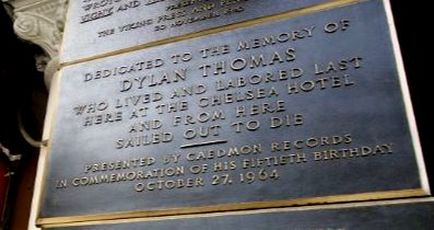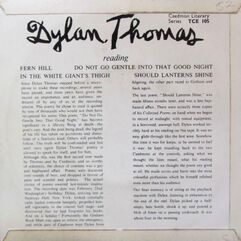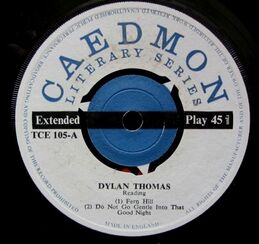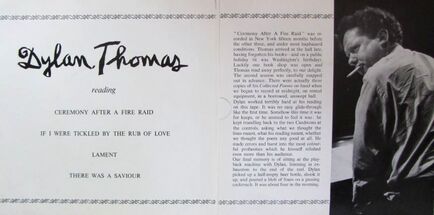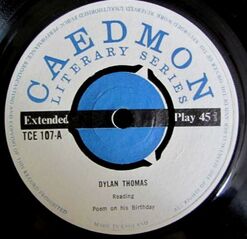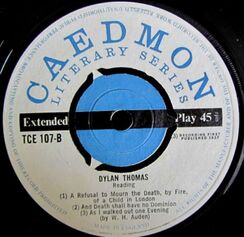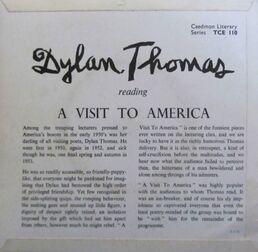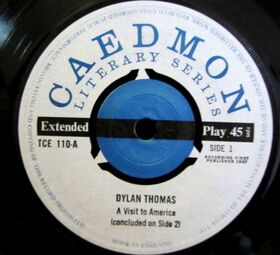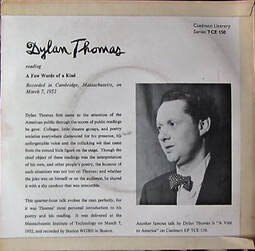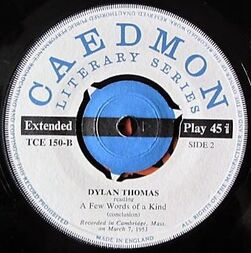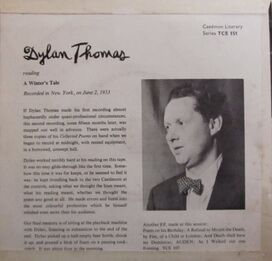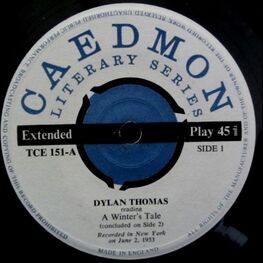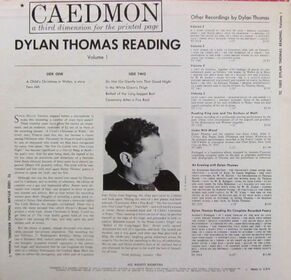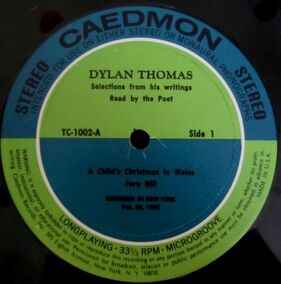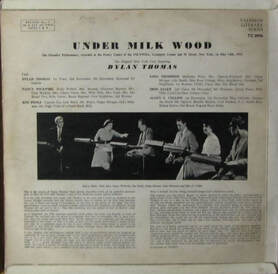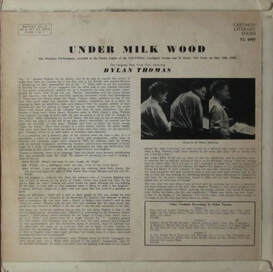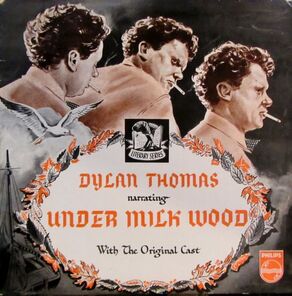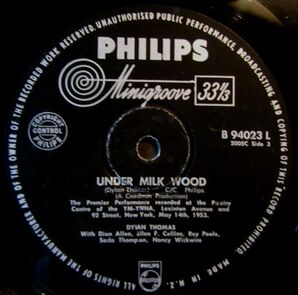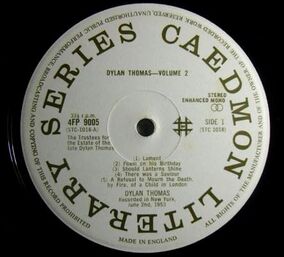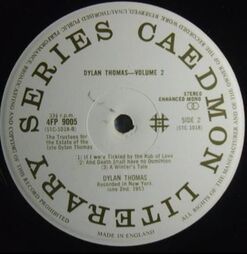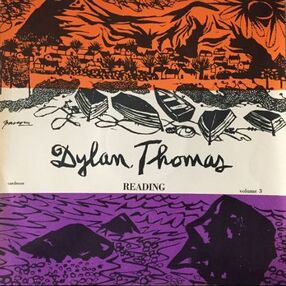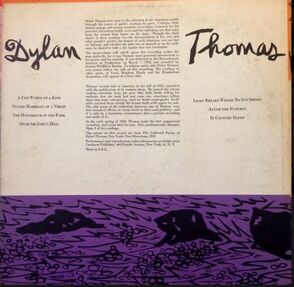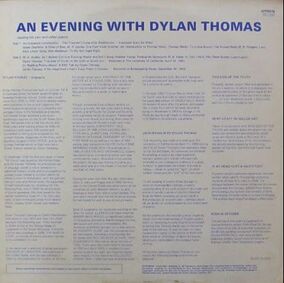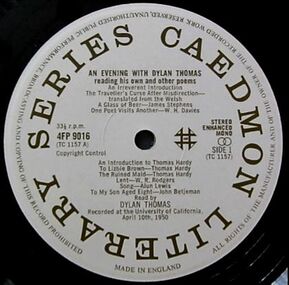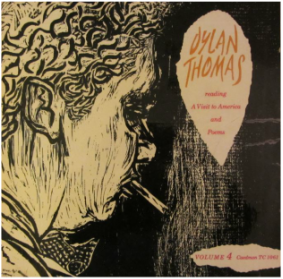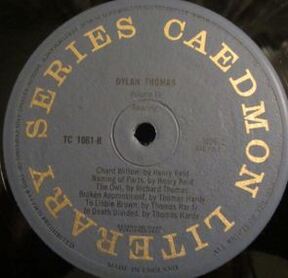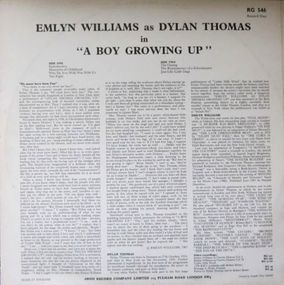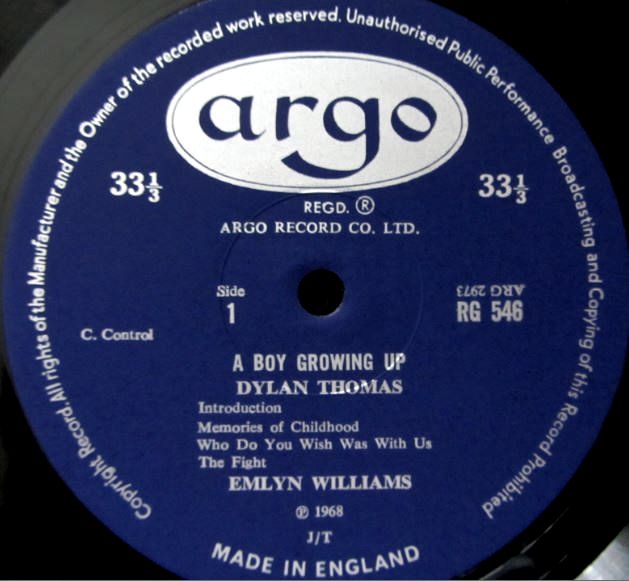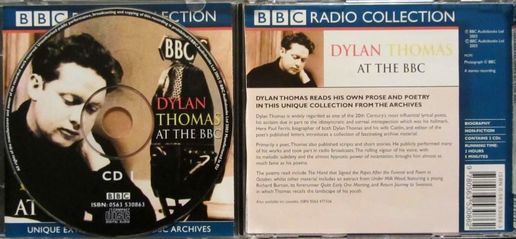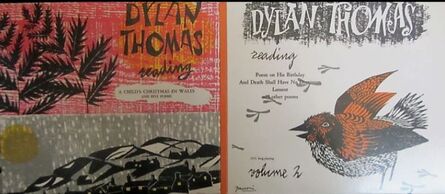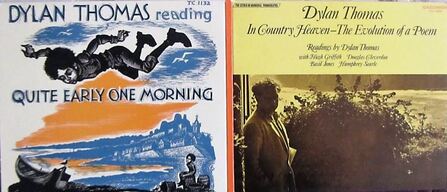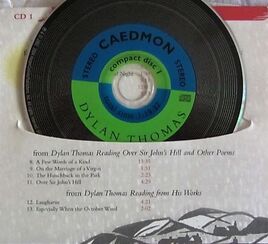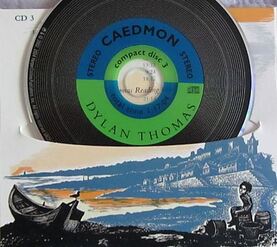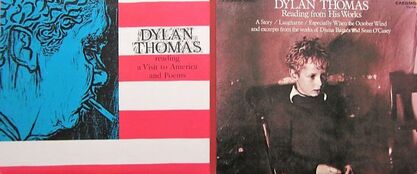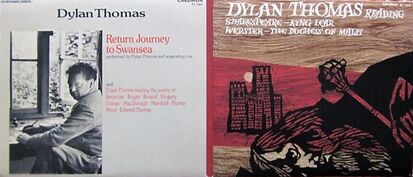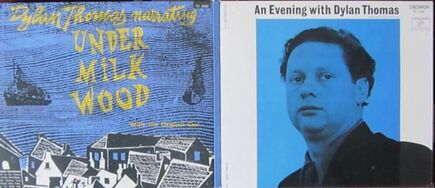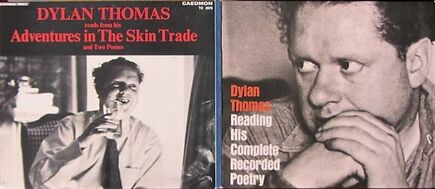The Recorded Voice of Dylan Thomas
"(Dylan) had a speaking voice of the utmost magnificence, range and beauty, and his speaking of poetry was as sublime as his writing of poetry. The 'Lions and fires of his flaming breath,' to use a phrase of his own, were such that all pride, all light, walked in the lines that, speaking he made his own. To hear him read his own poetry was a revelation. It was a great pride to me to hear him read my own poetry." - Dame Edith Sitwell
"Dylan Thomas's voice has added a new dimension to literary history. He will surely be remembered as the first in modern literature to be both as maker and speaker of poetry." - The New York Times
"Dylan Thomas's voice has added a new dimension to literary history. He will surely be remembered as the first in modern literature to be both as maker and speaker of poetry." - The New York Times
Dylan Thomas and Caedmon Records - A Brief History
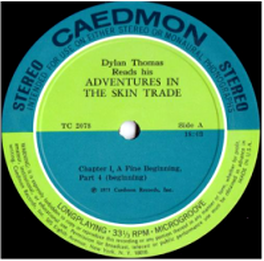
In 1952, two college graduates from Columbia University, Barbara Holdridge and Marianne Roney, approached Dylan Thomas after attending one of his performances at the 92nd Street YMCA with the suggestion that they record him reading his poetry with a view to releasing his voice on vinyl discs using a new concept of their's called 'spoken word recordings'. Using the fledgling record label that they had recently founded, Caedmon Records, not only would they would achieve instant success with their innovative idea, but between themselves and Dylan Thomas they would become a part of the history of recorded sound by bringing not only poetry to a mass audience but by creating what was to become known worldwide as the 'Audiobook'.
The date for Dylan Thomas's first recording for Caedmon was set for the 22nd of February at The Steinway Hall located on 37th Street, New York under the supervision of sound engineer Peter Bartok, son of the famous Hungarian composer. Dylan arrived with a sheaf of crumpled papers and promptly set himself in front of the microphone at the edge of the stage, and began the recording, reading clear and loud the poems he had personally selected. Dylan Thomas chose to record 'Fern Hill', 'Do Not Go Gentle Into That Good Night', 'In The White Giant's Thigh', 'Ballad Of The Long-Legged Bait' and 'Ceremony After A Fire Raid'.
When Dylan thomas had finished his readings it was noticed that there was probably only just enough material to fill one side of a long-playing album. Dylan Thomas was asked if he had brought along anything else he could record, he hadn't. Fortuitously he remembered he had just had a piece published in Harper's Bazaar, and so a copy of the magazine was promptly sent out for and eventually found.
The piece in question was 'A Child's Christmas In Wales'. Dylan read the piece so perfectly, so gently, and so beautifully and with so much warmth, humour and passion that it remains to this day, one of the most-loved Christmas stories in recording history.
The relationship between Caedmon and Dylan was, albeit brief, an extremely successful and productive one. If it were not for the insight of the two ladies who established Caedmon, Dylan's wonderful interpretations of his own work, which were to include 'Return Journey', 'Reminiscences Of Childhood' and 'Quite Early One Morning' as well as many other essays, short stories and a whole array of his poems.,would be limited to the radio recordings he made for the B.B.C. many of which are not of the best quality, held in their own archives or sadly, lost forever.
Caedmon, due mainly to the success of 'A Child's Christmas In Wales', went on to release many more albums of writers reading their own work, including such names as Auden, T.S.Eliot, Edith Sitwell and Ernest Hemingway as well as many notable actors reading the words of others, Burton recorded several albums for Caedmon, as did John Gielgud, Claire Bloom, Maggie Smith, Laurence Olivier, Ralph Richardson and Paul Schofield.
After Dylan's death in 1953, Barbara Holdridge and Marianne Roney, as a tribute and expression of gratitude to Dylan, paid for the memorial stone that stands, to this day, in Cwmdonkin Park, Swansea.The Caedmon label was sold, firstly to Raytheon in 1971, and finally to Harper Collins in 1987.
The date for Dylan Thomas's first recording for Caedmon was set for the 22nd of February at The Steinway Hall located on 37th Street, New York under the supervision of sound engineer Peter Bartok, son of the famous Hungarian composer. Dylan arrived with a sheaf of crumpled papers and promptly set himself in front of the microphone at the edge of the stage, and began the recording, reading clear and loud the poems he had personally selected. Dylan Thomas chose to record 'Fern Hill', 'Do Not Go Gentle Into That Good Night', 'In The White Giant's Thigh', 'Ballad Of The Long-Legged Bait' and 'Ceremony After A Fire Raid'.
When Dylan thomas had finished his readings it was noticed that there was probably only just enough material to fill one side of a long-playing album. Dylan Thomas was asked if he had brought along anything else he could record, he hadn't. Fortuitously he remembered he had just had a piece published in Harper's Bazaar, and so a copy of the magazine was promptly sent out for and eventually found.
The piece in question was 'A Child's Christmas In Wales'. Dylan read the piece so perfectly, so gently, and so beautifully and with so much warmth, humour and passion that it remains to this day, one of the most-loved Christmas stories in recording history.
The relationship between Caedmon and Dylan was, albeit brief, an extremely successful and productive one. If it were not for the insight of the two ladies who established Caedmon, Dylan's wonderful interpretations of his own work, which were to include 'Return Journey', 'Reminiscences Of Childhood' and 'Quite Early One Morning' as well as many other essays, short stories and a whole array of his poems.,would be limited to the radio recordings he made for the B.B.C. many of which are not of the best quality, held in their own archives or sadly, lost forever.
Caedmon, due mainly to the success of 'A Child's Christmas In Wales', went on to release many more albums of writers reading their own work, including such names as Auden, T.S.Eliot, Edith Sitwell and Ernest Hemingway as well as many notable actors reading the words of others, Burton recorded several albums for Caedmon, as did John Gielgud, Claire Bloom, Maggie Smith, Laurence Olivier, Ralph Richardson and Paul Schofield.
After Dylan's death in 1953, Barbara Holdridge and Marianne Roney, as a tribute and expression of gratitude to Dylan, paid for the memorial stone that stands, to this day, in Cwmdonkin Park, Swansea.The Caedmon label was sold, firstly to Raytheon in 1971, and finally to Harper Collins in 1987.
The plaque which adorns the foyer of The Chelsea Hotel in New York, commissioned and donated by Caedmon Records on October the 27th 1964 to commemorate what would have been Dylan Thomas's fiftieth birthday.
A Selection Of Caedmon Extended Play Vinyl Singles Featuring The Recorded Voice Of Dylan Thomas
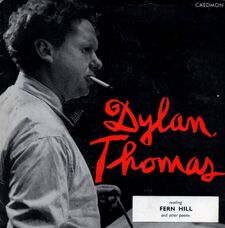
'Dylan Thomas Reading Fern Hill and Other Poems' Caedmon Literary Series TCE 105
The first vinyl single to be released by Caedmon as part of their 'Literary Series' of 'spoken word' recordings was Dylan Thomas reading a wonderful version of one of his most beautiful poems, 'Fern Hill'. Also recorded for this extended play single were three of the most famous poems ever to have been written by the poet; 'Do Not Go Gentle Into That Good Night', 'In The White Giant's Thigh' and 'Should Lantern's Shine'.
This copy is the original U.K. release, issued in a laminated picture sleeve featuring an image of Dylan Thomas, captured during one of his many readings which became synonymous with this series of releases, becoming the standard cover. This copy was released on a blue and white Caedmon 'Literary Series' label and issued with the catalogue number TCE 105.
The first vinyl single to be released by Caedmon as part of their 'Literary Series' of 'spoken word' recordings was Dylan Thomas reading a wonderful version of one of his most beautiful poems, 'Fern Hill'. Also recorded for this extended play single were three of the most famous poems ever to have been written by the poet; 'Do Not Go Gentle Into That Good Night', 'In The White Giant's Thigh' and 'Should Lantern's Shine'.
This copy is the original U.K. release, issued in a laminated picture sleeve featuring an image of Dylan Thomas, captured during one of his many readings which became synonymous with this series of releases, becoming the standard cover. This copy was released on a blue and white Caedmon 'Literary Series' label and issued with the catalogue number TCE 105.
The reverse of the record cover and record label for the Caedmon release of 'Dylan Thomas reading Fern Hill'
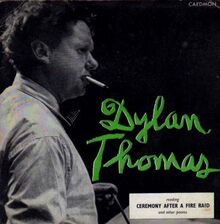
'Dylan Thomas Reading Ceremony After A Fire Raid and Other Poems' Caedmon Literary Series TCE 106
Released by Caedmon Records as part of their 'Literary Series' of 7" extended play vinyl singles is this recording of Dylan Thomas reading another four poems, beginning with his powerful War poem, 'Ceremony After A Fire Raid' and followed by three further poems, 'If I Were Tickled By The Rub Of Love', 'Lament' and 'There Was A Saviour'.
This copy was released by Caedmon on a blue and white label, presented in a gate-fold sleeve and issued with the catalogue number TCE 106.
The text from the cover notes reads;
'Ceremony After A Fire Raid' was recorded in New York fifteen months before the other three, and under most haphazard conditions. Thomas arrived at the hall late, having forgotten his books - and on a public holiday (it was Washington's birthday). Luckily one book shop was open and Thomas read away perfectly, to our delight. The second session was carefully mapped out in advance. There were actually three copies of his 'Collected Poems' on hand when we began to record at midnight, on rented equipment, in a borrowed, unswept hall'.
Released by Caedmon Records as part of their 'Literary Series' of 7" extended play vinyl singles is this recording of Dylan Thomas reading another four poems, beginning with his powerful War poem, 'Ceremony After A Fire Raid' and followed by three further poems, 'If I Were Tickled By The Rub Of Love', 'Lament' and 'There Was A Saviour'.
This copy was released by Caedmon on a blue and white label, presented in a gate-fold sleeve and issued with the catalogue number TCE 106.
The text from the cover notes reads;
'Ceremony After A Fire Raid' was recorded in New York fifteen months before the other three, and under most haphazard conditions. Thomas arrived at the hall late, having forgotten his books - and on a public holiday (it was Washington's birthday). Luckily one book shop was open and Thomas read away perfectly, to our delight. The second session was carefully mapped out in advance. There were actually three copies of his 'Collected Poems' on hand when we began to record at midnight, on rented equipment, in a borrowed, unswept hall'.
The interior of the gate-fold sleeve for the Caedmon release of 'Dylan Thomas Reading Ceremony After A Fire Raid and Other Poems'
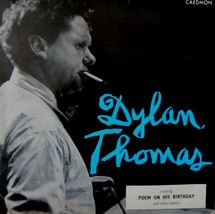
'Dylan Thomas Reading Poem On His Birthday and Other Poems' Caedmon Literary Series TCE 107
Released by Caedmon as part of their 'Literary Series' of 7" extended play vinyl singles is this copy of Dylan reading four poems, three of his own compositions and the inclusion of a poem by W. H. Auden.
On this original U.K. release from 1957 Caedmon capture Dylan reading hauntingly beautiful renditions of 'Poem On his Birthday' as well as 'A Refusal To Mourn The Death, By Fire, Of A Child In London', 'And Death Shall Have No Dominion' and W. H. Auden's poem, 'As I Walked Out One Evening'.
Released on the Caedmon blue and white label in a laminated picture sleeve and issued with the catalogue number TCE 107.
Released by Caedmon as part of their 'Literary Series' of 7" extended play vinyl singles is this copy of Dylan reading four poems, three of his own compositions and the inclusion of a poem by W. H. Auden.
On this original U.K. release from 1957 Caedmon capture Dylan reading hauntingly beautiful renditions of 'Poem On his Birthday' as well as 'A Refusal To Mourn The Death, By Fire, Of A Child In London', 'And Death Shall Have No Dominion' and W. H. Auden's poem, 'As I Walked Out One Evening'.
Released on the Caedmon blue and white label in a laminated picture sleeve and issued with the catalogue number TCE 107.
The record labels for the 1957 Caedmon release of 'Dylan Thomas Reading Poem On His Birthday and Other Poems'
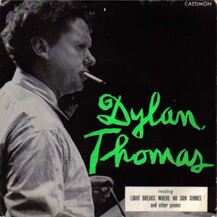
'Dylan Thomas Reading Light Breaks Where No Sun Shines and Other Poems' Caedmon Literary Series TCE 108
Released by Caedmon Records as part of their 'Literary Series' of 7" extended play vinyl singles is this recording of Dylan Thomas reading five of his most haunting poems, 'Light Breaks Where No Sun Shines', 'After the Funeral', 'On The Marriage Of A Virgin', 'The Hunchback In The Park' and the beautiful landscape poem,'Over Sir John's Hill'.
This extended play vinyl single was released by Caedmon in 1957 on a blue and white Caedmon label, presented in a laminated gate-fold sleeve and issued with the catalogue number TCE 108.
The cover notes, written by Caedmon, state that;
"Dylan Thomas first came to the attention of the American public by the scores of public readings he gave. Colleges, little theatre groups and poetry societies everywhere clamoured for his presence, his unforgettable voice and the rollicking wit that came from the rotund little figure on the stage. These recordings were made by Station WGBH in Boston of a reading he gave at the Massachusetts Institute of Technology on March 7, 1952."
Released by Caedmon Records as part of their 'Literary Series' of 7" extended play vinyl singles is this recording of Dylan Thomas reading five of his most haunting poems, 'Light Breaks Where No Sun Shines', 'After the Funeral', 'On The Marriage Of A Virgin', 'The Hunchback In The Park' and the beautiful landscape poem,'Over Sir John's Hill'.
This extended play vinyl single was released by Caedmon in 1957 on a blue and white Caedmon label, presented in a laminated gate-fold sleeve and issued with the catalogue number TCE 108.
The cover notes, written by Caedmon, state that;
"Dylan Thomas first came to the attention of the American public by the scores of public readings he gave. Colleges, little theatre groups and poetry societies everywhere clamoured for his presence, his unforgettable voice and the rollicking wit that came from the rotund little figure on the stage. These recordings were made by Station WGBH in Boston of a reading he gave at the Massachusetts Institute of Technology on March 7, 1952."
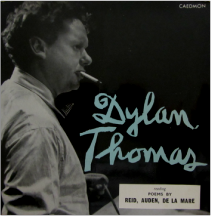
'Dylan Thomas Reading Poems By Reid, Auden, De La Mare' Caedmon Literary Series TCE 109
Released by Caedmon Records as part of their 'Literary Series' of 7" extended play vinyl singles is this recording of Dylan Thomas reading a selection of poetry solely by other writers which includes, 'Naming Of Parts' by Henry Reid, 'The Bards' by Walter de la Mare, 'Master And Bos'n Song' by W. H. Auden, 'The Owl' by Edward Thomas and 'Broken Appointment', 'To Lisbie Brown' and 'In Death Divided' by Thomas Hardy.
This copy was released on a Caedmon Records blue and white label in a special laminated, fold-out gate-fold sleeve and issued with the catalogue number TCE 109.
The sleeve notes, enclosed within the gatefold cover, recall the recording session...
"Among the trouping lecturers pressed to America's bosom in the early 1950's was her darling of all visiting poets, Dylan Thomas. He went first in 1950, again in 1952, and sick though he was, one final spring and autumn in 1953.
He was so readily accessible, so friendly-puppy-like, that everyone might be pardoned for imagining that Dylan had bestowed the high order of privileged friendship. Yet few recognised in the side-splitting quips, the romping behaviour, the melting gaze and mussed-up little figure, a dignity of despair tightly reined, an isolation imposed by the gift which had set him apart from others, however much he might rebel.
After a short a witty introductory talk, he descended into the cavernous regions of poetry. Often it was his own poetry, but occasionally the whole evening was devoted to other contemporary poets, and that, too, was a treat.
For the poets whom Dylan selected were those with whom he had a true affinity. They ranged from Yeats to MacNiece, from Hardy to de la Mare, but they all wrote in an intonation of which he was a master, and they all expressed philosophies to which his own was akin. And let the influence rummagers listen as Thomas reads poems by Hardy, who, as he sdays, "was writing poetry quite a time before this century began, but who has become recognized only comparatively recently as a very great poet indeed." Influence upon a poet like Thomas is not to be looked for in obvious style hallmarks, such as the provocatively coupled words which one critic, in an attempt to prove Thomas an inferior imitator, compared with Gerard Manley Hopkins - evidently not knowing, or caring, that poetic art goes back to Homer at least! The influence which one gifted poet (along with how many more) exerts upon another is a subtle thing, to be found perhaps in the clean thrust of the lines, or in the pervading melancholy air. If it is a true influence, and not a mere colouring, it would hardly be discernible at all, except as an affinity between two poets of the same cast of mind.
Neither Henry Reid nor Edward Thomas (no relation to Dylan) are well known in America, although these readings may well awaken interest, if only because of Henry Reid's hilarious parody of T. S. Eliot. But Reid's "Naming Of Parts," which works beautifully around an army rifle lesson, is an arresting lyric poem; and Edward Thomas has been greatly acclaimed by English critics. In his introductory remarks Dylan Thomas described Edward Thomas simply as "a poet who was killed in the last war...was it?...but one".
Released by Caedmon Records as part of their 'Literary Series' of 7" extended play vinyl singles is this recording of Dylan Thomas reading a selection of poetry solely by other writers which includes, 'Naming Of Parts' by Henry Reid, 'The Bards' by Walter de la Mare, 'Master And Bos'n Song' by W. H. Auden, 'The Owl' by Edward Thomas and 'Broken Appointment', 'To Lisbie Brown' and 'In Death Divided' by Thomas Hardy.
This copy was released on a Caedmon Records blue and white label in a special laminated, fold-out gate-fold sleeve and issued with the catalogue number TCE 109.
The sleeve notes, enclosed within the gatefold cover, recall the recording session...
"Among the trouping lecturers pressed to America's bosom in the early 1950's was her darling of all visiting poets, Dylan Thomas. He went first in 1950, again in 1952, and sick though he was, one final spring and autumn in 1953.
He was so readily accessible, so friendly-puppy-like, that everyone might be pardoned for imagining that Dylan had bestowed the high order of privileged friendship. Yet few recognised in the side-splitting quips, the romping behaviour, the melting gaze and mussed-up little figure, a dignity of despair tightly reined, an isolation imposed by the gift which had set him apart from others, however much he might rebel.
After a short a witty introductory talk, he descended into the cavernous regions of poetry. Often it was his own poetry, but occasionally the whole evening was devoted to other contemporary poets, and that, too, was a treat.
For the poets whom Dylan selected were those with whom he had a true affinity. They ranged from Yeats to MacNiece, from Hardy to de la Mare, but they all wrote in an intonation of which he was a master, and they all expressed philosophies to which his own was akin. And let the influence rummagers listen as Thomas reads poems by Hardy, who, as he sdays, "was writing poetry quite a time before this century began, but who has become recognized only comparatively recently as a very great poet indeed." Influence upon a poet like Thomas is not to be looked for in obvious style hallmarks, such as the provocatively coupled words which one critic, in an attempt to prove Thomas an inferior imitator, compared with Gerard Manley Hopkins - evidently not knowing, or caring, that poetic art goes back to Homer at least! The influence which one gifted poet (along with how many more) exerts upon another is a subtle thing, to be found perhaps in the clean thrust of the lines, or in the pervading melancholy air. If it is a true influence, and not a mere colouring, it would hardly be discernible at all, except as an affinity between two poets of the same cast of mind.
Neither Henry Reid nor Edward Thomas (no relation to Dylan) are well known in America, although these readings may well awaken interest, if only because of Henry Reid's hilarious parody of T. S. Eliot. But Reid's "Naming Of Parts," which works beautifully around an army rifle lesson, is an arresting lyric poem; and Edward Thomas has been greatly acclaimed by English critics. In his introductory remarks Dylan Thomas described Edward Thomas simply as "a poet who was killed in the last war...was it?...but one".
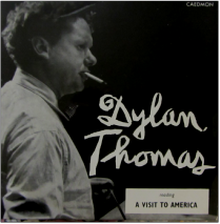
'Dylan Thomas Reading A Visit To America' Caedmon Literary Series TCE 110
Released by Caedmon Records, again as part of their 'Literary Series' of 7" extended play vinyl singles is a recording of Dylan Thomas reading his own light-hearted prose composition, 'A Visit To America'.
Released on a Caedmon Records white and blue label this is a laminated single-sleeve edition issued with the catalogue number TCE 110.
This is the original U.K. issue which was released in 1957.
The text below, taken from the sleeve notes, reads;
"Among the trouping lecturers pressed to America's bosom in the early 1950's was her darling of all visiting poets, Dylan Thomas. He went first in 1950, again in 1952, and sick though he was, one final spring and autumn in 1953.
He was so readily accessible, so friendly-puppy-like, that everyone might be pardoned for imagining that Dylan had bestowed the high order of privileged friendship. Yet few recognised in the side-splitting quips, the romping behaviour, the melting gaze and mussed up little figure, a dignity of despair tightly reined, an isolation imposed by the gift which had set him apart from others, however much he might rebel.
'A Visit To America' is one of the funniest pieces ever written on the lecturing clan, and we are lucky to have it in the richly humourous Thomas delivery. But it is also, in retrospect, a kind of self-crucifixion before the multitudes, and we hear now what the audience failed to perceive then, the bitterness of a man bewildered and alone among throngs of his admirers....'
'A Visit to America' was highly popular with the audiences to whom Thomas read. It was an ice-breaker, and of course his sly impishness so captivated everyone that even the least poetry-minded of the group was bound to be 'with' him for the remainder of the programme".
Released by Caedmon Records, again as part of their 'Literary Series' of 7" extended play vinyl singles is a recording of Dylan Thomas reading his own light-hearted prose composition, 'A Visit To America'.
Released on a Caedmon Records white and blue label this is a laminated single-sleeve edition issued with the catalogue number TCE 110.
This is the original U.K. issue which was released in 1957.
The text below, taken from the sleeve notes, reads;
"Among the trouping lecturers pressed to America's bosom in the early 1950's was her darling of all visiting poets, Dylan Thomas. He went first in 1950, again in 1952, and sick though he was, one final spring and autumn in 1953.
He was so readily accessible, so friendly-puppy-like, that everyone might be pardoned for imagining that Dylan had bestowed the high order of privileged friendship. Yet few recognised in the side-splitting quips, the romping behaviour, the melting gaze and mussed up little figure, a dignity of despair tightly reined, an isolation imposed by the gift which had set him apart from others, however much he might rebel.
'A Visit To America' is one of the funniest pieces ever written on the lecturing clan, and we are lucky to have it in the richly humourous Thomas delivery. But it is also, in retrospect, a kind of self-crucifixion before the multitudes, and we hear now what the audience failed to perceive then, the bitterness of a man bewildered and alone among throngs of his admirers....'
'A Visit to America' was highly popular with the audiences to whom Thomas read. It was an ice-breaker, and of course his sly impishness so captivated everyone that even the least poetry-minded of the group was bound to be 'with' him for the remainder of the programme".
The reverse of the record cover and iconic blue and white Caedmon record label from the release of 'Dylan Thomas Reads A Visit To America'.
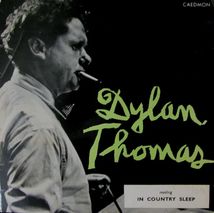
'Dylan Thomas Reading In Country Sleep' Caedmon Literary Series 149
A copy of the original 7" extended play vinyl, single-sleeve Caedmon Records release of 'Dylan Thomas Reading In Country Sleep'.
This edition was released on the Caedmon Literary Series label and was issued with the catalogue number TCE 149.
This unique recording of Dylan Thomas reading the complete poem 'In Country Sleep' was recorded in New York in the November of 1951.
The text below, taken from the sleeve notes, reads;
"Dylan Thomas's second visit to America, in the autumn of 1951, coincided with the publication of 'In Country Sleep'. He toured the circuit reading selections from his new, thin little book, telling his audience that the book had just come out, sometimes telling them that some enterprising (and no doubt avant-garde) bookseller awaited them outside the lecture halls with copies for sale. this poem however, was one of Thomas' very best sustained efforts, he seems never to have read publicly; and is only by fortuitous circumstance that a private recording was made of it".
A copy of the original 7" extended play vinyl, single-sleeve Caedmon Records release of 'Dylan Thomas Reading In Country Sleep'.
This edition was released on the Caedmon Literary Series label and was issued with the catalogue number TCE 149.
This unique recording of Dylan Thomas reading the complete poem 'In Country Sleep' was recorded in New York in the November of 1951.
The text below, taken from the sleeve notes, reads;
"Dylan Thomas's second visit to America, in the autumn of 1951, coincided with the publication of 'In Country Sleep'. He toured the circuit reading selections from his new, thin little book, telling his audience that the book had just come out, sometimes telling them that some enterprising (and no doubt avant-garde) bookseller awaited them outside the lecture halls with copies for sale. this poem however, was one of Thomas' very best sustained efforts, he seems never to have read publicly; and is only by fortuitous circumstance that a private recording was made of it".
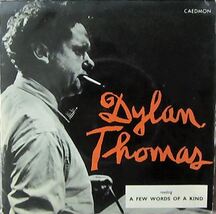
'Dylan Thomas Reading A Few Words Of A Kind' Caedmon Literary Series TCE 150
A copy of the original British Caedmon Records 7" extended play vinyl release of 'Dylan Thomas Reading A Few Words Of A Kind'.
This copy was released by Caedmon Records and was issued with the catalogue number TCE 150.
The reading by Dylan Thomas of 'A Few Words Of A Kind' took place at the Massachusetts Institute of Technology on the 5th of March, 1952. This fifteen minute recording evokes Dylan Thomas perfectly, for it was Dylan Thomas's most personal introduction to his poetry and his reading of them.
A copy of the original British Caedmon Records 7" extended play vinyl release of 'Dylan Thomas Reading A Few Words Of A Kind'.
This copy was released by Caedmon Records and was issued with the catalogue number TCE 150.
The reading by Dylan Thomas of 'A Few Words Of A Kind' took place at the Massachusetts Institute of Technology on the 5th of March, 1952. This fifteen minute recording evokes Dylan Thomas perfectly, for it was Dylan Thomas's most personal introduction to his poetry and his reading of them.
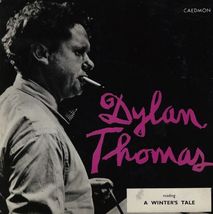
'Dylan Thomas Reading A Winter's Tale' Caedmon Literary Series TCE 151
A copy of the original British Caedmon Records 7" extended play vinyl release of 'Dylan Thomas Reading A Winter's Tale'.
This copy was released on the Caedmon 'Literary Series' blue and white label and was issued with the catalogue number TCE 151.
This disc was originally issued in England in 1959.
This recording of Dylan Thomas's beautiful poem 'A Winter's Tale' was recorded in New York on the second of June 1953. During this recording session the poems, 'Poem On his Birthday', 'A Refusal To Mourn', 'And Death Shall Have No Dominion' and W.H. Auden's,'As I Walked Out One Evening' were also recorded. All poems have been released by Caedmon Records.
A copy of the original British Caedmon Records 7" extended play vinyl release of 'Dylan Thomas Reading A Winter's Tale'.
This copy was released on the Caedmon 'Literary Series' blue and white label and was issued with the catalogue number TCE 151.
This disc was originally issued in England in 1959.
This recording of Dylan Thomas's beautiful poem 'A Winter's Tale' was recorded in New York on the second of June 1953. During this recording session the poems, 'Poem On his Birthday', 'A Refusal To Mourn', 'And Death Shall Have No Dominion' and W.H. Auden's,'As I Walked Out One Evening' were also recorded. All poems have been released by Caedmon Records.
The reverse of the record sleeve and an image of the record label for the Caedmon release, Dylan Thomas Reads A Winter's Tale'
A Selection Of Caedmon Vinyl Albums Featuring The Recorded Voice Of Dylan Thomas
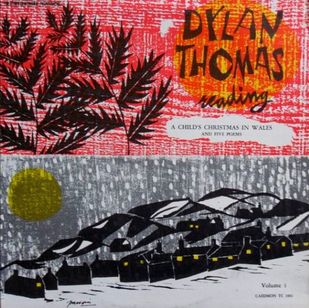
Dylan Thomas Reading,Volume One, 'A Child's Christmas In Wales and Five Poems'
A copy of the ninth pressing, dating from January 1964, of the American vinyl release of 'Dylan Thomas Reading Selections From His Writings Volume One'.
This stereo edition was released by Caedmon Records on a green and blue label which was issued with the catalogue number TC-1002.
The stunning cover woodcut artwork, highly evocative of the era, was by the famous artist Antonio Frasconi.
This vinyl record is notable for being the first album to include Dylan Thomas's most beloved prose piece, 'A Child's Christmas In Wales'.
The story behind this most famous of spoken word recording sessions is told on the reverse of the album, and reads;
"Since Dylan Thomas stepped before a microphone to make this recording, a number of years have passed. These eventful years have given the record an importance, and an audience, undreamt of by any of us there at the recording session. "A Child's Christmas In Wales", the lovely story Thomas read that day, has become a classic among Christmas tales. The poetry he chose to read is quoted by tens of thousands who would not then have recognized his name. One poem, "Do Not Go Gentle Into That Good Night" has become significant as a life-cry flung at death - the poet's own. And the poet being dead, the legend of his life has taken on accretions and distortions of a fantastic kind. Some intimate journals of these years have already appeared. Others will probably follow. The truth will be confounded and lost until once again Dylan Thomas' poetry is allowed to speak for itself, and for him.
Although this was the first record ever made by Thomas and by Caedmon, and so worthy of solemnity, the choice of contents was a gay and haphazard affair. poems were discussed over rounds of beer, and dropped in favour of puns and scandals and politics. But as time before the recording session grew short, thoughts of including a prose piece occurred to Dylan. One afternoon - the place a restaurant called The Little Shrimp - the thoughts crystallized. There was a story - the name escaped him - which Harper's Bazaar had printed a while back. About Christmas In Wales. Could we get hold of it? The issue finally gotten hold of was the Bazaar's sole existing file copy, lent only upon the most solemn oath of return.
But the choice of poems, though discussed over many a table, awaited last-minute inspiration. the recording day was February 22, Washington's Birthday, Dylan, arriving late at Steinway Hall, looked celestially calm, hailed everyone benignly, propelled himself vigorously to the concert hall stage - and discovered he had forgotten his books. And on a holiday! Fortunately the Gotham Book Mart was open to relieve the emergency, and while part of Caedmon kept Dylan from fidgeting, the other part raced to Gotham and back again. During the interval a few poems had been selected - 'Ceremony After a Fire Raid', 'Do Not Go Gentle Into That Good Night', 'Fern Hill' -and with hardly a pause or stutter, Dylan recorded these and 'A Child's Christmas In Wales'. Then, seeming to have run out of ideas, he perched himself on the edge of the stage, and proceeded to look receptive. Someone named 'In The White Giant's Thigh' and 'Ballad Of The Long-Legged Bait'. Dylan easily agreed, abandoned his stub of a cigarette, and read. The record was finished, and it was good, and after one final play-back as fillip, the whole easy, laughing group adjourned across the street to The Anchor for something in the way of celebration. But no one, and Dylan probably least of all, realised that in one afternoon he had given to the world the best of himself, for all time."
The other recordings which feature on this American Caedmon release are the above mentioned poems, Fern Hill, Do Not Go Gentle Into That Good Night, In The White Giant's Thigh, Ballad Of The Long-Legged Bait and Ceremony After A Fire Raid.
The reverse of the cover features a studio photograph of Dylan Thomas captured by photographer G. D. Hackett.
A copy of the ninth pressing, dating from January 1964, of the American vinyl release of 'Dylan Thomas Reading Selections From His Writings Volume One'.
This stereo edition was released by Caedmon Records on a green and blue label which was issued with the catalogue number TC-1002.
The stunning cover woodcut artwork, highly evocative of the era, was by the famous artist Antonio Frasconi.
This vinyl record is notable for being the first album to include Dylan Thomas's most beloved prose piece, 'A Child's Christmas In Wales'.
The story behind this most famous of spoken word recording sessions is told on the reverse of the album, and reads;
"Since Dylan Thomas stepped before a microphone to make this recording, a number of years have passed. These eventful years have given the record an importance, and an audience, undreamt of by any of us there at the recording session. "A Child's Christmas In Wales", the lovely story Thomas read that day, has become a classic among Christmas tales. The poetry he chose to read is quoted by tens of thousands who would not then have recognized his name. One poem, "Do Not Go Gentle Into That Good Night" has become significant as a life-cry flung at death - the poet's own. And the poet being dead, the legend of his life has taken on accretions and distortions of a fantastic kind. Some intimate journals of these years have already appeared. Others will probably follow. The truth will be confounded and lost until once again Dylan Thomas' poetry is allowed to speak for itself, and for him.
Although this was the first record ever made by Thomas and by Caedmon, and so worthy of solemnity, the choice of contents was a gay and haphazard affair. poems were discussed over rounds of beer, and dropped in favour of puns and scandals and politics. But as time before the recording session grew short, thoughts of including a prose piece occurred to Dylan. One afternoon - the place a restaurant called The Little Shrimp - the thoughts crystallized. There was a story - the name escaped him - which Harper's Bazaar had printed a while back. About Christmas In Wales. Could we get hold of it? The issue finally gotten hold of was the Bazaar's sole existing file copy, lent only upon the most solemn oath of return.
But the choice of poems, though discussed over many a table, awaited last-minute inspiration. the recording day was February 22, Washington's Birthday, Dylan, arriving late at Steinway Hall, looked celestially calm, hailed everyone benignly, propelled himself vigorously to the concert hall stage - and discovered he had forgotten his books. And on a holiday! Fortunately the Gotham Book Mart was open to relieve the emergency, and while part of Caedmon kept Dylan from fidgeting, the other part raced to Gotham and back again. During the interval a few poems had been selected - 'Ceremony After a Fire Raid', 'Do Not Go Gentle Into That Good Night', 'Fern Hill' -and with hardly a pause or stutter, Dylan recorded these and 'A Child's Christmas In Wales'. Then, seeming to have run out of ideas, he perched himself on the edge of the stage, and proceeded to look receptive. Someone named 'In The White Giant's Thigh' and 'Ballad Of The Long-Legged Bait'. Dylan easily agreed, abandoned his stub of a cigarette, and read. The record was finished, and it was good, and after one final play-back as fillip, the whole easy, laughing group adjourned across the street to The Anchor for something in the way of celebration. But no one, and Dylan probably least of all, realised that in one afternoon he had given to the world the best of himself, for all time."
The other recordings which feature on this American Caedmon release are the above mentioned poems, Fern Hill, Do Not Go Gentle Into That Good Night, In The White Giant's Thigh, Ballad Of The Long-Legged Bait and Ceremony After A Fire Raid.
The reverse of the cover features a studio photograph of Dylan Thomas captured by photographer G. D. Hackett.
A further copy of 'Dylan Thomas Reading Volume One' is held in the Richard Burton Museum collection, A U.K. vinyl release dating from February 1957.
Released on a blue Caedmon Literary Series record label with the catalogue number TC 1002, it features the same cover design and linear notes but lacks the black and white photograph that graces the back cover of the American release.
Released on a blue Caedmon Literary Series record label with the catalogue number TC 1002, it features the same cover design and linear notes but lacks the black and white photograph that graces the back cover of the American release.
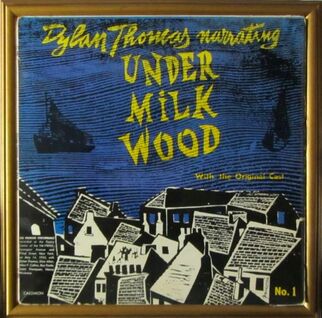
Dylan Thomas Narrating Under Milk Wood With The Original Cast
An original copy of the two disc vinyl set of 'Dylan Thomas Narrating Under Milk Wood With The Original Cast', recorded at the Poetry Centre of the YM-YWHA, Lexington Avenue and 92nd Street, New York on May the 14th, 1953.
These vinyl discs were released on the Caedmon Literary Series' green and gold record label with the catalogue numbers TC 0996 / 7 in the December of 1958.
With Dylan Thomas in the role of Narrator / First Voice, he was supported by an American cast which included Nancy Wickwire, Roy Poole, Sada Thompson, Dion Allen and Allen F. Collins.
The notes from the reverse of the first album cover tell the fortuitous story of how the Dylan Thomas version of 'Under Milk Wood' came to be preserved for prosperity;
'This is the record of Dylan Thomas's final, bawdy, beautiful work, of its premiere performance on May the 14th, 1953 with Thomas, a cast of five American actors, and an audience.
It is the only recording ever made with Thomas in the cast, and it owes its existence to the chance thought someone had just before curtain time of setting up the little tape recorder that was at hand and laying a microphone on the floor at the centre of the stage. The later performances were not taped because a studio performance for Caedmon was planned though Thomas did not live to do it. That this recording was not erased or lost or thrown away remains some kind of miracle.
An original copy of the two disc vinyl set of 'Dylan Thomas Narrating Under Milk Wood With The Original Cast', recorded at the Poetry Centre of the YM-YWHA, Lexington Avenue and 92nd Street, New York on May the 14th, 1953.
These vinyl discs were released on the Caedmon Literary Series' green and gold record label with the catalogue numbers TC 0996 / 7 in the December of 1958.
With Dylan Thomas in the role of Narrator / First Voice, he was supported by an American cast which included Nancy Wickwire, Roy Poole, Sada Thompson, Dion Allen and Allen F. Collins.
The notes from the reverse of the first album cover tell the fortuitous story of how the Dylan Thomas version of 'Under Milk Wood' came to be preserved for prosperity;
'This is the record of Dylan Thomas's final, bawdy, beautiful work, of its premiere performance on May the 14th, 1953 with Thomas, a cast of five American actors, and an audience.
It is the only recording ever made with Thomas in the cast, and it owes its existence to the chance thought someone had just before curtain time of setting up the little tape recorder that was at hand and laying a microphone on the floor at the centre of the stage. The later performances were not taped because a studio performance for Caedmon was planned though Thomas did not live to do it. That this recording was not erased or lost or thrown away remains some kind of miracle.
The reverse covers of the two-disc vinyl set, 'Dylan Thomas Narrating Under Milk Wood' released by Caedmon Records in 1958
Dylan Thomas Narrating Under Milk Wood With The Original Cast
A differently packaged, and extremely rare,copy of 'Dylan Thomas Narrating Under Milk Wood'. This edition was released solely in New Zealand and was released as a two-vinyl set on the Philips Literary Series record Label, catalogue number B 94022/23BL. The exact year of release is unknown but it would appear to be contemporary with the British release which features above. The cover, which includes a stunning illustration by an uncredited artist, was printed by Whitcombe and Tombs Limited, based in new Zealand.
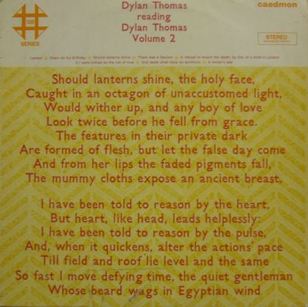
'Dylan Thomas Reading Dylan Thomas' Volume Two
An original copy of the British stereo pressing of the Caedmon Records vinyl album, 'Dylan Thomas Reading Dylan Thomas Volume Two'.
This album was released on a white and gold Caedmon Literary Series label and issued with the catalogue number 4 FP 9005 / STC 1018.
The poems which appear on this album were recorded in New York on the 2nd of June 1953.
The reverse of the album cover features a detailed biography of Dylan Thomas as well as brief notes on each poem.
The track-listing for this album is as follows;
Lament / Poem On His Birthday / Should Lanterns Shine / There Was A Saviour / A Refusal To Mourn The Death, By Fire, Of A Child In London / If I Were Tickled By The Rub Of Love / And Death Shall Have No Dominion / A Winter's Tale.
An original copy of the British stereo pressing of the Caedmon Records vinyl album, 'Dylan Thomas Reading Dylan Thomas Volume Two'.
This album was released on a white and gold Caedmon Literary Series label and issued with the catalogue number 4 FP 9005 / STC 1018.
The poems which appear on this album were recorded in New York on the 2nd of June 1953.
The reverse of the album cover features a detailed biography of Dylan Thomas as well as brief notes on each poem.
The track-listing for this album is as follows;
Lament / Poem On His Birthday / Should Lanterns Shine / There Was A Saviour / A Refusal To Mourn The Death, By Fire, Of A Child In London / If I Were Tickled By The Rub Of Love / And Death Shall Have No Dominion / A Winter's Tale.
The record labels for this Caedmon release of 'Dylan Thomas Reading Dylan Thomas Volume Two'.
Dylan Thomas Reading Volume Three
A first edition American copy of the Caedmon release, 'Dylan Thomas Reading Volume Three'.
This edition was released on a blue and silver Caedmon record label and issued with the catalogue number TC-1043. The readings on side one were recorded on March the 7th 1952 in Cambridge, Massachusetts (although the label erroneously states 1953) and includes the titles; A Few Words Of A Kind, On The Marriage Of A Virgin, The Hunchback In The Park and Over Sir John's Hill.
The poems on side two were recorded in New York in the November of 1951 and includes the poems; Light Breaks Where No Sun Shines, After The Funeral and In Country Sleep.
The cover notes to this original American release read;
"Dylan Thomas first came to the attention of the American public through the scores of public readings he gave.Colleges, little theatre groups and poetry societies everywhere clamoured for his presence, his unforgettable voice and the rollicking wit that came from the rotund little figure on the stage. Though the chief object of these readings was the interpretation of his own and other people's poetry, the humour of such situations was not lost on Thomas; and whether the joke was on himself or on the audience, he shared it with a shy candour that was irresistible.
The quarter-hour talk which opens this recording evokes the man perfectly, for it was Thomas' most personal introduction to his poetry and his reading. It was delivered at the Massachusetts Institute of Technology on March 7th, 1952, and recorded by Station WGBH in Boston. To achieve unity, only Dylan Thomas' poems follow the talk on this recording. His readings of other poets, of Yeats, Hopkins, Hardy and the Elizabethan dramatists, will appear at a later date.
Thomas' second visit to America, in the fall of 1951, coincided with the publication of 'In Country Sleep'. He toured the circuit reading selections from his new, thin little book, telling his audiences that the book had just come out, sometimes telling them that some enterprising (and no doubt avant-garde) bookseller awaited them outside the lecture halls with copies for sale. The title poem of the collection, however, one of Thomas' very best sustained efforts, he seems never to have read publicly; and it is only by fortuitous circumstance that a private recording was made of it.
In the early spring of 1952, Thomas made his first commercial recording, and a year later his last. This, posthumously, becomes opus three of his readings."
This edition was released on a blue and silver Caedmon record label and issued with the catalogue number TC-1043. The readings on side one were recorded on March the 7th 1952 in Cambridge, Massachusetts (although the label erroneously states 1953) and includes the titles; A Few Words Of A Kind, On The Marriage Of A Virgin, The Hunchback In The Park and Over Sir John's Hill.
The poems on side two were recorded in New York in the November of 1951 and includes the poems; Light Breaks Where No Sun Shines, After The Funeral and In Country Sleep.
The cover notes to this original American release read;
"Dylan Thomas first came to the attention of the American public through the scores of public readings he gave.Colleges, little theatre groups and poetry societies everywhere clamoured for his presence, his unforgettable voice and the rollicking wit that came from the rotund little figure on the stage. Though the chief object of these readings was the interpretation of his own and other people's poetry, the humour of such situations was not lost on Thomas; and whether the joke was on himself or on the audience, he shared it with a shy candour that was irresistible.
The quarter-hour talk which opens this recording evokes the man perfectly, for it was Thomas' most personal introduction to his poetry and his reading. It was delivered at the Massachusetts Institute of Technology on March 7th, 1952, and recorded by Station WGBH in Boston. To achieve unity, only Dylan Thomas' poems follow the talk on this recording. His readings of other poets, of Yeats, Hopkins, Hardy and the Elizabethan dramatists, will appear at a later date.
Thomas' second visit to America, in the fall of 1951, coincided with the publication of 'In Country Sleep'. He toured the circuit reading selections from his new, thin little book, telling his audiences that the book had just come out, sometimes telling them that some enterprising (and no doubt avant-garde) bookseller awaited them outside the lecture halls with copies for sale. The title poem of the collection, however, one of Thomas' very best sustained efforts, he seems never to have read publicly; and it is only by fortuitous circumstance that a private recording was made of it.
In the early spring of 1952, Thomas made his first commercial recording, and a year later his last. This, posthumously, becomes opus three of his readings."
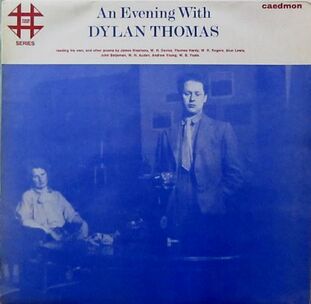
'An Evening With Dylan Thomas'
An original U.K. copy of the Caedmon vinyl record release entitled 'An Evening With Dylan Thomas Reading His Own And Other Poems'.
This copy was released on a grey and gold Caedmon Literary Series label and was issued with the catalogue number 4FP90 16 TC1157.
The recordings included on the album took place at Broadcasting House, London on September the 24th of 1949 and also at the University of California on April the 10th 1950.
Aside from four poems of his own, 'This Side Of Truth', 'In My Craft Or Sullen Art', 'If My Head Hurt A Hair's Foot' and 'Poem In October', Dylan Thomas chose to record the works of James Stephens, W. H. Davies, Thomas Hardy, W. R. Rogers, Alun Lewis, John Betjeman, W. H. Auden, Andrew Young and W. B. Yeats.
The reverse of the cover, written by Irish publisher, book collector and founder of the Enitharmon Press, Alan Clodd, includes a complete track-listing, a short biography of the poet and a summary of the recording which reads;
"This recording was made at a reading at the University of California on April 10, 1950 during the first of Dylan Thomas's now legendary visits to the United States. As customary he prefaced his reading of poems by other twentieth century writers with a short informal talk intended to put a receptive audience in a good humour to appreciate the poetry that was to follow - what he called the 'jam' of other writers' verses and the 'pill' of his own work.
To the reading of poetry Dylan brought a voice of incomparable richness, a poet's understanding of his craft, a love of the shape and sound of words, a sense of rhythm inherited from his Welsh ancestors, an actor's skill in the projection of emotion and - perhaps above all, an ability to communicate his own enjoyment of poetry.
All the poems on this recording were chosen by Dylan from his wide reading of English poetry and it is interesting to note that he is record as saying that Thomas Hardy was his favourite poet of the century. It was his habit to make handwritten copies of the poems he liked and there exists an anthology of about eighty poems laboriously transcribed in his crabbed handwriting.
Of the four poems by Dylan Thomas on the record the following background notes are attached.
'This Side Of Truth'. Probably written about 1944 and addressed to his son Llewelyn, to whom it is dedicated, the unexpected lucidity of this poems leads to the profound statement of the last lines in which"...all your deeds and words, Each truth, each lie, Die in unjudging love."
'In My Craft Or Sullen Art'. Taken in conjunction with 'This Side Of Truth' and written about the same time, this poem also reveals the new simplicity which came into Dylan's work at this time. It is notable for the intricacy of its rhyme-scheme, the second stanza repeating the rhyming pattern of the first, the third and fourth lines excepted.
'If My Head Hurt A Hair's Foot'. A poem rooted in personal experience, this was written when Caitlin Thomas was expecting the birth of their first child in 1939. The dialogue between the unborn child and its mother incorporates the concept, echoed from Donne, of life being a dying from the moment of birth. Nevertheless the poem ends on a note of miracle, "the endless beginning of prodigies suffers open".
'Poem In October'. The setting of this poem is Laugharne in Carmarthenshire where Dylan lived for the last few years of his life. It is another evocation of childhood standing comparison with the more famous 'Fern Hill', and has a similarly elaborate syllabic sound-structure and use of Biblical (chiefly New Testament) imagery.
The cover portrait on this U.K. release shows the famous photograph of Dylan and Caitlin Thomas in relaxed mood at their Manresa Road studio flat in Chelsea, captured in 1944 by renowned British journalist, Bill Brandt.
An original U.K. copy of the Caedmon vinyl record release entitled 'An Evening With Dylan Thomas Reading His Own And Other Poems'.
This copy was released on a grey and gold Caedmon Literary Series label and was issued with the catalogue number 4FP90 16 TC1157.
The recordings included on the album took place at Broadcasting House, London on September the 24th of 1949 and also at the University of California on April the 10th 1950.
Aside from four poems of his own, 'This Side Of Truth', 'In My Craft Or Sullen Art', 'If My Head Hurt A Hair's Foot' and 'Poem In October', Dylan Thomas chose to record the works of James Stephens, W. H. Davies, Thomas Hardy, W. R. Rogers, Alun Lewis, John Betjeman, W. H. Auden, Andrew Young and W. B. Yeats.
The reverse of the cover, written by Irish publisher, book collector and founder of the Enitharmon Press, Alan Clodd, includes a complete track-listing, a short biography of the poet and a summary of the recording which reads;
"This recording was made at a reading at the University of California on April 10, 1950 during the first of Dylan Thomas's now legendary visits to the United States. As customary he prefaced his reading of poems by other twentieth century writers with a short informal talk intended to put a receptive audience in a good humour to appreciate the poetry that was to follow - what he called the 'jam' of other writers' verses and the 'pill' of his own work.
To the reading of poetry Dylan brought a voice of incomparable richness, a poet's understanding of his craft, a love of the shape and sound of words, a sense of rhythm inherited from his Welsh ancestors, an actor's skill in the projection of emotion and - perhaps above all, an ability to communicate his own enjoyment of poetry.
All the poems on this recording were chosen by Dylan from his wide reading of English poetry and it is interesting to note that he is record as saying that Thomas Hardy was his favourite poet of the century. It was his habit to make handwritten copies of the poems he liked and there exists an anthology of about eighty poems laboriously transcribed in his crabbed handwriting.
Of the four poems by Dylan Thomas on the record the following background notes are attached.
'This Side Of Truth'. Probably written about 1944 and addressed to his son Llewelyn, to whom it is dedicated, the unexpected lucidity of this poems leads to the profound statement of the last lines in which"...all your deeds and words, Each truth, each lie, Die in unjudging love."
'In My Craft Or Sullen Art'. Taken in conjunction with 'This Side Of Truth' and written about the same time, this poem also reveals the new simplicity which came into Dylan's work at this time. It is notable for the intricacy of its rhyme-scheme, the second stanza repeating the rhyming pattern of the first, the third and fourth lines excepted.
'If My Head Hurt A Hair's Foot'. A poem rooted in personal experience, this was written when Caitlin Thomas was expecting the birth of their first child in 1939. The dialogue between the unborn child and its mother incorporates the concept, echoed from Donne, of life being a dying from the moment of birth. Nevertheless the poem ends on a note of miracle, "the endless beginning of prodigies suffers open".
'Poem In October'. The setting of this poem is Laugharne in Carmarthenshire where Dylan lived for the last few years of his life. It is another evocation of childhood standing comparison with the more famous 'Fern Hill', and has a similarly elaborate syllabic sound-structure and use of Biblical (chiefly New Testament) imagery.
The cover portrait on this U.K. release shows the famous photograph of Dylan and Caitlin Thomas in relaxed mood at their Manresa Road studio flat in Chelsea, captured in 1944 by renowned British journalist, Bill Brandt.
The reverse cover and original record label of the Caedmon Literary Series release of 'An Evening With Dylan Thomas'.
'Dylan Thomas Reading Volume Four' A Visit To America and Poems
An original copy of the U.K. pressing of the Caedmon Literary Series release, 'Dylan Thomas Reading Volume Four - A Visit To America and Poems'.
Included on this release is Dylan Thomas's recording of his own prose composition, 'A Visit To America' subtitled 'An Irreverent Preamble,' as well as a selection of poems from other writers of his choosing, which became part of his regular lecture tour repertoire.
The track-listing for this album is as follows...
A Visit To America / The Bards by Walter de la Mare / Master And Bos'n Song by W. H. Auden / As I Walked Out One Evening by W. H. Auden / Chard Witlow by Henry Reid / Naming Of Parts by Henry Reid / The Owl by Edward Thomas / Broken Appointment by Thomas Hardy / To Lisbie Brown by Thomas Hardy and In Death Divided by Thomas Hardy.
The album was released by Caedmon as part of their Literary Series and was issued on a green and gold Caedmon label with the catalogue number TC 1061. The cover art features a striking woodcut portrait of Dylan Thomas which was produced especially for the original cover by the artist Antonio Frasconi.
'A Visit To America' was recorded by radio station WGBH in 1953 at the Institute of Technology based in Cambridge, Massachusetts.
Included on this release is Dylan Thomas's recording of his own prose composition, 'A Visit To America' subtitled 'An Irreverent Preamble,' as well as a selection of poems from other writers of his choosing, which became part of his regular lecture tour repertoire.
The track-listing for this album is as follows...
A Visit To America / The Bards by Walter de la Mare / Master And Bos'n Song by W. H. Auden / As I Walked Out One Evening by W. H. Auden / Chard Witlow by Henry Reid / Naming Of Parts by Henry Reid / The Owl by Edward Thomas / Broken Appointment by Thomas Hardy / To Lisbie Brown by Thomas Hardy and In Death Divided by Thomas Hardy.
The album was released by Caedmon as part of their Literary Series and was issued on a green and gold Caedmon label with the catalogue number TC 1061. The cover art features a striking woodcut portrait of Dylan Thomas which was produced especially for the original cover by the artist Antonio Frasconi.
'A Visit To America' was recorded by radio station WGBH in 1953 at the Institute of Technology based in Cambridge, Massachusetts.
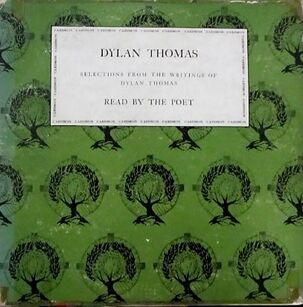
'Selections From The Writings of Dylan Thomas - Read By The Poet'
An original American copy of the Caedmon vinyl album, 'Selections From The Writings of Dylan Thomas'. This copy was released on a blue and silver Caedmon record label and issued with the catalogue number TC 1002, exactly as the Caedmon vinyl album, ''Dylan Thomas Reading Volume One'.
The track-listing for this original vinyl release is;
Fern Hill / A Child's Christmas in Wales / Do Not Go Gentle Into That Good Night / In The White Giant's Thigh / Ballad of the Long-Legged Bait / Ceremony After A Fire Raid.
A selection of contemporary reviews of this vinyl album, written for Harper's Magazine, High Fidelity, The Saturday Review and The New York Times, appear on the reverse of the album cover and read;
'Script and sound is an ideal way to present poetry, and when the reader is Dylan Thomas the ideal is more than met. Anyone who heard him this past spring will know that, like the fishermen in his 'Ballad of the Long-Legged Bait', 'His fiery reel sings off its flames'. Besides the beauty of the poems, his reading brings out their depth, clarity and variety'.
'The recording bis gorgeous, and Thomas talks English in a way to make most of the rest of us shrink with shame for our abuse of this great instrument...Prize item is the half-hour metrical short story, A Child's Christmas in Wales, a straight, tangibly atmospheric recital and very, very funny'.
'In some ways the most arresting of these records is that of Dylan Thomas, who is clearly in the tradition of the Welsh bard no less than that of the English poet. He reads his verse and his prose with such melodious power, with such subtly and ardently projected rhythms, that one feels that, good as it is, his poetry on the printed page is dull by comparison'.
'A personal choice is the record made by Dylan Thomas. It makes one understand why the Welsh poet draws full houses for his public readings. there is so much music in his voice that it carries the listener along, enchanted by the sound of the words and the rich imagery.'
An original American copy of the Caedmon vinyl album, 'Selections From The Writings of Dylan Thomas'. This copy was released on a blue and silver Caedmon record label and issued with the catalogue number TC 1002, exactly as the Caedmon vinyl album, ''Dylan Thomas Reading Volume One'.
The track-listing for this original vinyl release is;
Fern Hill / A Child's Christmas in Wales / Do Not Go Gentle Into That Good Night / In The White Giant's Thigh / Ballad of the Long-Legged Bait / Ceremony After A Fire Raid.
A selection of contemporary reviews of this vinyl album, written for Harper's Magazine, High Fidelity, The Saturday Review and The New York Times, appear on the reverse of the album cover and read;
'Script and sound is an ideal way to present poetry, and when the reader is Dylan Thomas the ideal is more than met. Anyone who heard him this past spring will know that, like the fishermen in his 'Ballad of the Long-Legged Bait', 'His fiery reel sings off its flames'. Besides the beauty of the poems, his reading brings out their depth, clarity and variety'.
'The recording bis gorgeous, and Thomas talks English in a way to make most of the rest of us shrink with shame for our abuse of this great instrument...Prize item is the half-hour metrical short story, A Child's Christmas in Wales, a straight, tangibly atmospheric recital and very, very funny'.
'In some ways the most arresting of these records is that of Dylan Thomas, who is clearly in the tradition of the Welsh bard no less than that of the English poet. He reads his verse and his prose with such melodious power, with such subtly and ardently projected rhythms, that one feels that, good as it is, his poetry on the printed page is dull by comparison'.
'A personal choice is the record made by Dylan Thomas. It makes one understand why the Welsh poet draws full houses for his public readings. there is so much music in his voice that it carries the listener along, enchanted by the sound of the words and the rich imagery.'
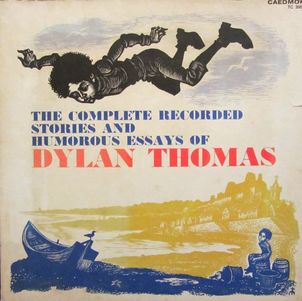
'The Complete Recorded Stories and Humorous Essays of Dylan Thomas'
An original copy of the American release of the triple vinyl album box-set edition of 'The Complete Recorded Stories And Humorous Essays Of Dylan Thomas'.
This edition was released on a blue and green Caedmon record label and was issued with the catalogue number TC 3006.
The track-listing for this box-set collection is as follows;
A Child's Christmas In Wales / Quite Early One Morning / Reminiscences Of Childhood / Return Journey To Swansea / A Few Words Of A Kind / A Visit To America / An Irreverent Introduction / A Visit To Grandpa's / Holiday Memory / A Story / Laugharne.
The sleeve notes, written by Marianne Mantell of Caedmon Records, read;
"The prose of Dylan Thomas has many reasons for being, and some of them neatly define the practical difference between prose and poetry; There are more magazines that print prose; except for 'The Iliad' or 'An Essay On Man', a story tends to be longer than a poem and therefore pays better, and is more likely to fill half an hour on the B.B.C.
Prose, particularly a poet's prose, is also the better vehicle for drifts of memory, where the form, the structure is that very drift. Poetry is too compact for that, too intense. In the stories of his childhood, Christmas, his grandfather, Wales, Dylan Thomas is at his most charming, and, some say, his best.
When he was not writing of his past, Dylan wrote of his present. As he once analyzed it, "My fearful instinct is to bloat myself like a frog, to magnify my unimportance, to ring a bell for a name, so that, as I bluster and loom twice my size, the hunt, seeing me monstrous, bays by after different and humbler prey." So he wrote numerous hilarious pieces satirizing himself, leading literary critics in merry circles, insulting the people who lionized-and supported-him.
Caedmon came to record his prose, and to build his fame as a writer of it, in rather slapdash fashion. He was to have recorded an hour of poetry, and arrived at the studio a week late, without any books. We could find only a few poems. Then Dylan vaguely remembered that a story of his had been published in some magazine. Some Magazine? It was February 22, in the era before Congress legislated when Washington was born; New York was closed. In a dizzying flurry of research, carried on under the pressure of keeping the poet both happy and sober, the work was located. It promptly became the most widely-heard story ever recorded: A Child's Christmas In Wales. The following year he recorded for Caedmon again, and unfortunately followed the advice of Oscar Williams to read only poetry. Therefore the other selections in this album came from many and distant sources, a good many from the B.B.C., others from tapes fortuitously made at public readings around the country.
He was considered everywhere, and considered himself, a poet. Yet he wrote, and published, prose, and already as a very young man was advising others about writing it: "...Put a sheet of paper in front of you, and without thinking twice, write half, or a quarter, or all of a short story. Don't begin with a polished idea in which every incident is fixed in your mind. Just shove a girl on a seashore on a summer day and let her make her own story. Write, write, regardless of everything. Your present method of story-writing, the draft after draft, the interminable going over-again can be compared to the method of the marksman who spends weeks and weeks polishing his rifle, weeks and weeks cleaning it, weeks and weeks getting the exact ammunition for it, weeks and weeks deciding on a target, weeks and weeks weighing his rifle in his hand, weeks and weeks weighing it in a different way, and, at the end of the year, having a pop at the bull's-eye. Why not, for a change, fire off round after round of ammunition from any old gun you can get hold of. You'll miss hundreds of times, but you're bound to get the bull's-eye a lot of times too."
Dylan was nineteen when he wrote that, and a lot more adept at dishing out such advice than taking it. His stories no less than his poems are the work of a careful craftsman. Yet eighteen or twenty years later, in the early 50's when most of the pieces on this album originated, he was somehow shooting at random. Cirrhosis was destroying his liver, and his mind was so burdened with taxes and women and audiences and self-pity that he could not create; yet his financial needs grew more and more pressing and his only source of income was from writing and reading what he wrote.
Thus the last act of Under Milk Wood was written during the second intermission - and no one would have ever known from the play itself, had not some of us who were present told the story. A Few Words Of A Kind and Irreverent Introduction were not written at all but ad-libbed. Such feats, however, are not only very unnerving to the performer; the very necessity for them only served to destroy him sooner. And more important for anyone seeking to learn from Dylan's example, they could only have been brought off, not by someone who shot bull or bull's-eyes at random, but by one who knew his terrain so minutely and polished his tools so constantly and carefully, that his very thinking was well-crafted.
Out of the sights he saw in his mind and the sound of them sprang the prose of Dylan Thomas. Born of the marriage of poverty and poetry, it was composed for his voice. And so it has been preserved.
A Child's Christmas In Wales' was recorded by Caedmon Records on February the 22nd 1952. 'A Few Words Of A Kind' and 'A Visit To America' were recorded by The Massachusetts Institute of Technology and broadcast by Station WGBH in Cambridge, Massachusetts in 1953. 'An Irreverent Introduction' was recorded at an evening of readings given by Dylan Thomas on April the 10th 1950 at the University Of California. All the other recordings on this box-set were recorded by the B.B.C.
The charming cover design for this release was by artist Fritz Eichenberg.
An original copy of the American release of the triple vinyl album box-set edition of 'The Complete Recorded Stories And Humorous Essays Of Dylan Thomas'.
This edition was released on a blue and green Caedmon record label and was issued with the catalogue number TC 3006.
The track-listing for this box-set collection is as follows;
A Child's Christmas In Wales / Quite Early One Morning / Reminiscences Of Childhood / Return Journey To Swansea / A Few Words Of A Kind / A Visit To America / An Irreverent Introduction / A Visit To Grandpa's / Holiday Memory / A Story / Laugharne.
The sleeve notes, written by Marianne Mantell of Caedmon Records, read;
"The prose of Dylan Thomas has many reasons for being, and some of them neatly define the practical difference between prose and poetry; There are more magazines that print prose; except for 'The Iliad' or 'An Essay On Man', a story tends to be longer than a poem and therefore pays better, and is more likely to fill half an hour on the B.B.C.
Prose, particularly a poet's prose, is also the better vehicle for drifts of memory, where the form, the structure is that very drift. Poetry is too compact for that, too intense. In the stories of his childhood, Christmas, his grandfather, Wales, Dylan Thomas is at his most charming, and, some say, his best.
When he was not writing of his past, Dylan wrote of his present. As he once analyzed it, "My fearful instinct is to bloat myself like a frog, to magnify my unimportance, to ring a bell for a name, so that, as I bluster and loom twice my size, the hunt, seeing me monstrous, bays by after different and humbler prey." So he wrote numerous hilarious pieces satirizing himself, leading literary critics in merry circles, insulting the people who lionized-and supported-him.
Caedmon came to record his prose, and to build his fame as a writer of it, in rather slapdash fashion. He was to have recorded an hour of poetry, and arrived at the studio a week late, without any books. We could find only a few poems. Then Dylan vaguely remembered that a story of his had been published in some magazine. Some Magazine? It was February 22, in the era before Congress legislated when Washington was born; New York was closed. In a dizzying flurry of research, carried on under the pressure of keeping the poet both happy and sober, the work was located. It promptly became the most widely-heard story ever recorded: A Child's Christmas In Wales. The following year he recorded for Caedmon again, and unfortunately followed the advice of Oscar Williams to read only poetry. Therefore the other selections in this album came from many and distant sources, a good many from the B.B.C., others from tapes fortuitously made at public readings around the country.
He was considered everywhere, and considered himself, a poet. Yet he wrote, and published, prose, and already as a very young man was advising others about writing it: "...Put a sheet of paper in front of you, and without thinking twice, write half, or a quarter, or all of a short story. Don't begin with a polished idea in which every incident is fixed in your mind. Just shove a girl on a seashore on a summer day and let her make her own story. Write, write, regardless of everything. Your present method of story-writing, the draft after draft, the interminable going over-again can be compared to the method of the marksman who spends weeks and weeks polishing his rifle, weeks and weeks cleaning it, weeks and weeks getting the exact ammunition for it, weeks and weeks deciding on a target, weeks and weeks weighing his rifle in his hand, weeks and weeks weighing it in a different way, and, at the end of the year, having a pop at the bull's-eye. Why not, for a change, fire off round after round of ammunition from any old gun you can get hold of. You'll miss hundreds of times, but you're bound to get the bull's-eye a lot of times too."
Dylan was nineteen when he wrote that, and a lot more adept at dishing out such advice than taking it. His stories no less than his poems are the work of a careful craftsman. Yet eighteen or twenty years later, in the early 50's when most of the pieces on this album originated, he was somehow shooting at random. Cirrhosis was destroying his liver, and his mind was so burdened with taxes and women and audiences and self-pity that he could not create; yet his financial needs grew more and more pressing and his only source of income was from writing and reading what he wrote.
Thus the last act of Under Milk Wood was written during the second intermission - and no one would have ever known from the play itself, had not some of us who were present told the story. A Few Words Of A Kind and Irreverent Introduction were not written at all but ad-libbed. Such feats, however, are not only very unnerving to the performer; the very necessity for them only served to destroy him sooner. And more important for anyone seeking to learn from Dylan's example, they could only have been brought off, not by someone who shot bull or bull's-eyes at random, but by one who knew his terrain so minutely and polished his tools so constantly and carefully, that his very thinking was well-crafted.
Out of the sights he saw in his mind and the sound of them sprang the prose of Dylan Thomas. Born of the marriage of poverty and poetry, it was composed for his voice. And so it has been preserved.
A Child's Christmas In Wales' was recorded by Caedmon Records on February the 22nd 1952. 'A Few Words Of A Kind' and 'A Visit To America' were recorded by The Massachusetts Institute of Technology and broadcast by Station WGBH in Cambridge, Massachusetts in 1953. 'An Irreverent Introduction' was recorded at an evening of readings given by Dylan Thomas on April the 10th 1950 at the University Of California. All the other recordings on this box-set were recorded by the B.B.C.
The charming cover design for this release was by artist Fritz Eichenberg.
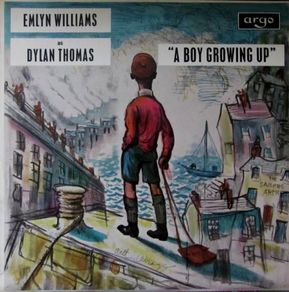
Emlyn Williams as Dylan Thomas in 'A Boy Growing Up' The Argo Record Company, 1968
A first pressing of the vinyl album, 'A Boy Growing Up' which features Emlyn Williams in the role of Dylan Thomas, reading a selection of the delightful short stories written by the Welsh poet.
This original U.K. first pressing was released in 1968 by the Argo Record Company Limited on a blue and silver Argo label and was issued with the catalogue number RG 546.
The track-listing for this outstanding album is as follows;
Introduction / Memories Of Childhood / Who Do You Wish Was With Us? / The Fight / The Outing / The Reminiscence Of A Schoolmaster / Just Like Little Dogs.
The extensive cover notes, especially written by Emlyn Williams for this beautifully produced Argo release, read;
"You mean to say you never met him?"
That is the comment people invariably make when, of Dylan Thomas, I say, 'He must have been fun'. The conversation has usually happened in London or New York after a performance of 'Dylan Thomas - A Boy Growing Up', and the accompanying look of shocked incredulity rather disconcerted me at first. Then I realised that it was, after all, a kind of compliment; for if I had conveyed, on the stage, as intimate an acquaintance with Dylan as I felt I possessed (without having ever met him), then it must indeed seem strange that physically we had never encountered each other.
We nearly met, one night in 1950, at Christopher Isherwood's hose in Santa Monica; I was making a movie, Dylan was on his first reading tour. But he never turned up. I'm glad he didn't; Hollywood (even in the company of such a transatlantically-planted bloom as Herr-Issy-Voo) doesn't seem the right setting for a first meeting between two Welshman. A Swansea pub on a damp night would have fitted better; fog smelling of dirty sea, yes - smog smelling of clean celluloid, no. Dylan never worked in the theatre, and we never even nearly met, after that.
But I feel i know him. No, I know I know him - and indeed what fun he must have been! What fun he is, in every paragraph of the prose I have got to know by heart, besides all the prose which (preparing this 'entertainment') I went about reading line by line with the loving care of the dredger after gold. The limpid-clear imagination of a brilliant child, the devastating humour of the completely honest man - no, child again, for even when (towards the end of the 'entertainment') the boy is grown up, you feel that essentially he is as much of a child as ever, and always will be.
What is more, I know him better than scores of people who did, if you know what I mean. And the people who did! I never imagined any writer could have had so many intimate friends as Dylan seems to have had; humourless, dedicated and vague, they stop me in the street, and (needless to say) they jog my elbow in the pub. "Oh yes, knew him well - many's the pint -which poems do you do?" I explain that I don't do the poems, because I personally find them too difficult for the theatre. Eyebrows here tend to be lifted - or do I mean high-brows? "But Dylan himself read his poems with great success!" ''I know'', I explain, "But Dylan was a law unto himself, with (a) an understanding of what he was saying, and (b) a voice which was a unique reading organ. There's no point in my trying to compete with that - anyway, I'm not a reader but a professional actor", "I see- well if you don't do the poems, what do you do?" I explain that I have adapted, for the stage, the stories and sketches. "Really? But Dylan was a serious poet-" "I know", I say, "but there was another side to him which I love and which I understand, a warm and simple and richly comic side which is beautifully at home in the theatre, as was proved in the stage production of 'Under Milk Wood' - and I want that side of him to live too". " I see...and you mean to say that you never met him?"
Mind you, I have met his mother, and have got to know her well. When I first set about constructing "DYLAN THOMAS GROWING UP", which displays Dylan from five to seventeen, I realised that not only was his mother tending to become a main character, but that she was not always in the conventional light: I thought of 'Adventures In The Skin Trade', and my heart sank. I visualised some busy-body of a neighbour calling on Mrs. Thomas in Carmarthen, South Wales - "I feel I ought to tell you there's that Emlyn Williams at it on the stage telling the audience about Dylan tearing up your photos and smashing the house, and the audience in fits of laughter at it, well, Mrs. Thomas that's not right is it?"
I wrote to her, explaining that I make it clear beforehand, to the audience, that this particular piece is a fantasy. She wrote back, "So long as you say it's a fantasy, I suppose it's alright - and what is more, that other one you do, about his Uncle and them all getting intoxicated on a charabanc outing - that's a fantasy too!" She came to a performance, and afterwards we met; I was more nervous than the time I was presented to Queen Mary.
Mrs. Thomas turned out to be a pretty white-haired little woman, with Dylan's little nose and merry features who hobbled in on two sticks, and put me at my ease at once.
"When you came on the stage and said you were Dylan, I didn't believe you, but by the end I did". I could have wished for no more satisfying compliment. I could tell she had cried, but had laughed too. "I want to come again. Yes, I lost him, and Daddy (her husband) and his sister Nancy, and fell down and broke both my legs, all in one year. It wasn't a great year for me, was it? If I'd had four legs, I suppose I'd have broken the extra two as well!...Daddy was the English master in the grammar-school, you know, and every day Daddy and Dylan used to read Shakespeare together, he was Dylan's favourite author, with Dickens...Daddy knew his Shakespeare backwards, many a time listening to the actors doing his plays on the wireless he used to say "But they're not getting it right!" 'Hush Daddy' I used to say, 'They're doing their best!'...People say to me, 'Mrs. Thomas, where did Dylan get his brains', well, I think that's rude, don't you? I always answer back 'I can't imagine where, it can't be from me, so it must be from Daddy!'...However did you learn all those words tonight?" she continued, "I don't want to sound rude, but you actors must have minds like sponges! I brought a present for you." She produced, out of a piece of brown-paper, a shallow gaudy cardboard box which had once contained ties bought from a cheap store. "Dylan always used to keep his poems in this when he stayed with me." I opened it; there were still two or three scraps of ruled paper, with (in his surprisingly small and meticulously rounded hand) the first drafts of poems, with at the side the doodled drawings which a child makes when it cannot think of 'anything to put'; one could see him sucking his pencil, drawing another face, sucking his pencil again.
Somebody sitting next to Mrs. Thomas remarked on the bubbling humanity which permeates the writing in 'A BOY GROWING UP' . "Yes," said the mother, simply, "There wasn't an ounce of harm in Dylan, bless him...the piece you do about the two of them going to the sea-shore, (Mrs.Thomas was referring to 'Who Do You Wish Was With Us?) , I remember him and the other boy missing the bus home and having to walk fifteen miles and they hadn't a bite of food and no money, so they climbed into an orchard and pinched some apples and the farmer chased them off - the state his clothes were in when he got home! But he enjoyed life..." She sighed, but she was smiling."
The reverse of the cover also features mini-biographies of both Emlyn Williams and Dylan Thomas.
The cover was printed by the Graphis Press Limited and features a beautiful cover painting by the artist and Argo illustrator, Arthur Wragg.
A first pressing of the vinyl album, 'A Boy Growing Up' which features Emlyn Williams in the role of Dylan Thomas, reading a selection of the delightful short stories written by the Welsh poet.
This original U.K. first pressing was released in 1968 by the Argo Record Company Limited on a blue and silver Argo label and was issued with the catalogue number RG 546.
The track-listing for this outstanding album is as follows;
Introduction / Memories Of Childhood / Who Do You Wish Was With Us? / The Fight / The Outing / The Reminiscence Of A Schoolmaster / Just Like Little Dogs.
The extensive cover notes, especially written by Emlyn Williams for this beautifully produced Argo release, read;
"You mean to say you never met him?"
That is the comment people invariably make when, of Dylan Thomas, I say, 'He must have been fun'. The conversation has usually happened in London or New York after a performance of 'Dylan Thomas - A Boy Growing Up', and the accompanying look of shocked incredulity rather disconcerted me at first. Then I realised that it was, after all, a kind of compliment; for if I had conveyed, on the stage, as intimate an acquaintance with Dylan as I felt I possessed (without having ever met him), then it must indeed seem strange that physically we had never encountered each other.
We nearly met, one night in 1950, at Christopher Isherwood's hose in Santa Monica; I was making a movie, Dylan was on his first reading tour. But he never turned up. I'm glad he didn't; Hollywood (even in the company of such a transatlantically-planted bloom as Herr-Issy-Voo) doesn't seem the right setting for a first meeting between two Welshman. A Swansea pub on a damp night would have fitted better; fog smelling of dirty sea, yes - smog smelling of clean celluloid, no. Dylan never worked in the theatre, and we never even nearly met, after that.
But I feel i know him. No, I know I know him - and indeed what fun he must have been! What fun he is, in every paragraph of the prose I have got to know by heart, besides all the prose which (preparing this 'entertainment') I went about reading line by line with the loving care of the dredger after gold. The limpid-clear imagination of a brilliant child, the devastating humour of the completely honest man - no, child again, for even when (towards the end of the 'entertainment') the boy is grown up, you feel that essentially he is as much of a child as ever, and always will be.
What is more, I know him better than scores of people who did, if you know what I mean. And the people who did! I never imagined any writer could have had so many intimate friends as Dylan seems to have had; humourless, dedicated and vague, they stop me in the street, and (needless to say) they jog my elbow in the pub. "Oh yes, knew him well - many's the pint -which poems do you do?" I explain that I don't do the poems, because I personally find them too difficult for the theatre. Eyebrows here tend to be lifted - or do I mean high-brows? "But Dylan himself read his poems with great success!" ''I know'', I explain, "But Dylan was a law unto himself, with (a) an understanding of what he was saying, and (b) a voice which was a unique reading organ. There's no point in my trying to compete with that - anyway, I'm not a reader but a professional actor", "I see- well if you don't do the poems, what do you do?" I explain that I have adapted, for the stage, the stories and sketches. "Really? But Dylan was a serious poet-" "I know", I say, "but there was another side to him which I love and which I understand, a warm and simple and richly comic side which is beautifully at home in the theatre, as was proved in the stage production of 'Under Milk Wood' - and I want that side of him to live too". " I see...and you mean to say that you never met him?"
Mind you, I have met his mother, and have got to know her well. When I first set about constructing "DYLAN THOMAS GROWING UP", which displays Dylan from five to seventeen, I realised that not only was his mother tending to become a main character, but that she was not always in the conventional light: I thought of 'Adventures In The Skin Trade', and my heart sank. I visualised some busy-body of a neighbour calling on Mrs. Thomas in Carmarthen, South Wales - "I feel I ought to tell you there's that Emlyn Williams at it on the stage telling the audience about Dylan tearing up your photos and smashing the house, and the audience in fits of laughter at it, well, Mrs. Thomas that's not right is it?"
I wrote to her, explaining that I make it clear beforehand, to the audience, that this particular piece is a fantasy. She wrote back, "So long as you say it's a fantasy, I suppose it's alright - and what is more, that other one you do, about his Uncle and them all getting intoxicated on a charabanc outing - that's a fantasy too!" She came to a performance, and afterwards we met; I was more nervous than the time I was presented to Queen Mary.
Mrs. Thomas turned out to be a pretty white-haired little woman, with Dylan's little nose and merry features who hobbled in on two sticks, and put me at my ease at once.
"When you came on the stage and said you were Dylan, I didn't believe you, but by the end I did". I could have wished for no more satisfying compliment. I could tell she had cried, but had laughed too. "I want to come again. Yes, I lost him, and Daddy (her husband) and his sister Nancy, and fell down and broke both my legs, all in one year. It wasn't a great year for me, was it? If I'd had four legs, I suppose I'd have broken the extra two as well!...Daddy was the English master in the grammar-school, you know, and every day Daddy and Dylan used to read Shakespeare together, he was Dylan's favourite author, with Dickens...Daddy knew his Shakespeare backwards, many a time listening to the actors doing his plays on the wireless he used to say "But they're not getting it right!" 'Hush Daddy' I used to say, 'They're doing their best!'...People say to me, 'Mrs. Thomas, where did Dylan get his brains', well, I think that's rude, don't you? I always answer back 'I can't imagine where, it can't be from me, so it must be from Daddy!'...However did you learn all those words tonight?" she continued, "I don't want to sound rude, but you actors must have minds like sponges! I brought a present for you." She produced, out of a piece of brown-paper, a shallow gaudy cardboard box which had once contained ties bought from a cheap store. "Dylan always used to keep his poems in this when he stayed with me." I opened it; there were still two or three scraps of ruled paper, with (in his surprisingly small and meticulously rounded hand) the first drafts of poems, with at the side the doodled drawings which a child makes when it cannot think of 'anything to put'; one could see him sucking his pencil, drawing another face, sucking his pencil again.
Somebody sitting next to Mrs. Thomas remarked on the bubbling humanity which permeates the writing in 'A BOY GROWING UP' . "Yes," said the mother, simply, "There wasn't an ounce of harm in Dylan, bless him...the piece you do about the two of them going to the sea-shore, (Mrs.Thomas was referring to 'Who Do You Wish Was With Us?) , I remember him and the other boy missing the bus home and having to walk fifteen miles and they hadn't a bite of food and no money, so they climbed into an orchard and pinched some apples and the farmer chased them off - the state his clothes were in when he got home! But he enjoyed life..." She sighed, but she was smiling."
The reverse of the cover also features mini-biographies of both Emlyn Williams and Dylan Thomas.
The cover was printed by the Graphis Press Limited and features a beautiful cover painting by the artist and Argo illustrator, Arthur Wragg.
The reverse cover to the first U.K. pressing of 'A Boy Growing Up', featuring the extensive sleeve notes written by Emlyn Williams and the original blue and silver Argo record label.
Emlyn Williams ' Dylan Thomas Growing Up' Original Theatre Programme, 1959
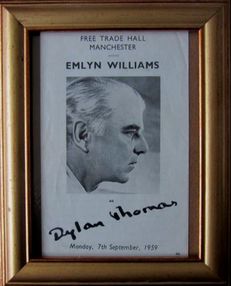
A copy of an original 1959 theatre programme for the performance of Emlyn Williams' one-man show, 'Dylan Thomas Growing Up', which took place at the Free Trade Hall, Manchester on Monday the 7th of September of that year.
Contained within the programme is a brief synopsis of the performance, a biography of Emlyn Williams, a full-page advertisment for the Decca gramophone release of 'Emlyn Williams as Charles Dickens'.
The introduction to the programme reads;
"Dylan Thomas was born in Swansea on 27th October, 1914, and died in New York on 9th November, 1953. Further information is superfluous. In the first item of this programme he introduces himself (through his mouth piece, the actor) to his theatre audience, and goes on from there.
It was when Emlyn Williams took part, in 1954, in the first stage performance of 'Under Milk Wood' that he realised how Dylan Thomas had been veering towards the theatre; and how immeasurably further the theatre might have been enriched by his talents. It became the actor's conviction that he should weave together, from the writer's other work, a theatrical entertainment. 'A Boy Growing Up' was first presented at the Festival of Bath, proceeding thence to a highly successful three months' season at the Globe Theatre, London, and then to a triumph in New York, where the performance was hailed a 'Smash Hit'.
This programme, for the Manchester performance of 'Dylan Thomas Growing Up', was printed by Vail & Company, Leeke Street, London.
Contained within the programme is a brief synopsis of the performance, a biography of Emlyn Williams, a full-page advertisment for the Decca gramophone release of 'Emlyn Williams as Charles Dickens'.
The introduction to the programme reads;
"Dylan Thomas was born in Swansea on 27th October, 1914, and died in New York on 9th November, 1953. Further information is superfluous. In the first item of this programme he introduces himself (through his mouth piece, the actor) to his theatre audience, and goes on from there.
It was when Emlyn Williams took part, in 1954, in the first stage performance of 'Under Milk Wood' that he realised how Dylan Thomas had been veering towards the theatre; and how immeasurably further the theatre might have been enriched by his talents. It became the actor's conviction that he should weave together, from the writer's other work, a theatrical entertainment. 'A Boy Growing Up' was first presented at the Festival of Bath, proceeding thence to a highly successful three months' season at the Globe Theatre, London, and then to a triumph in New York, where the performance was hailed a 'Smash Hit'.
This programme, for the Manchester performance of 'Dylan Thomas Growing Up', was printed by Vail & Company, Leeke Street, London.
Dylan Thomas Compact Disc Releases
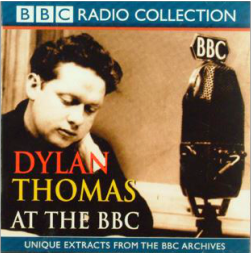
Dylan Thomas At The BBC
A two-disc compact disc set released as part of the 'B.B.C. Radio Collection' series of compact discs.
Dylan Thomas and Richard Burton biographer Paul Ferris introduces and provides the commentary for this selection of recordings which Dylan Thomas made especially for the B.B.C. from the years 1938 until 1953.
The tracks featured on this compact disc collection include, on the first disc, the earliest surviving B.B.C. recording which Dylan Thomas made in 1938 reading 'The Hand That Signed The Paper', the complete 1947 production of 'Return Journey', 'A Visit To Grandpa's' from 1952, Dylan Thomas's introduction 'On Reading One's Own Poems' followed by 'In My Craft And Sullen Art', 'After The Funeral' and 'A Refusal To Mourn' recorded in 1949 and the complete 1953 Welsh Home Service recording of 'Quite Early One Morning'.
The second disc begins with Dylan Thomas's own introduction, 'Reading One's Poems Aloud' which is followed by renditions of 'Poem In October', 'Over Sir John's Hill' and 'In The White Giant's Thigh'. Dylan Thomas's last contribution to the collection ends with three prose pieces, 'A Visit To America', The Outing' and finally 'Laugharne'.
The collection ends with an extract from 'Under Milk Wood', recorded for the B.B.C. Third Programme in 1954 featuring Richard Burton in the role of 'First Voice', which was produced by Douglas Cleverdon.
The collection was produced by Mark Jones and was released by BBC Audiobooks / The B.B.C. Radio Collection in 2003 and was issued with the ISBN 0-563-53086-3.
A two-disc compact disc set released as part of the 'B.B.C. Radio Collection' series of compact discs.
Dylan Thomas and Richard Burton biographer Paul Ferris introduces and provides the commentary for this selection of recordings which Dylan Thomas made especially for the B.B.C. from the years 1938 until 1953.
The tracks featured on this compact disc collection include, on the first disc, the earliest surviving B.B.C. recording which Dylan Thomas made in 1938 reading 'The Hand That Signed The Paper', the complete 1947 production of 'Return Journey', 'A Visit To Grandpa's' from 1952, Dylan Thomas's introduction 'On Reading One's Own Poems' followed by 'In My Craft And Sullen Art', 'After The Funeral' and 'A Refusal To Mourn' recorded in 1949 and the complete 1953 Welsh Home Service recording of 'Quite Early One Morning'.
The second disc begins with Dylan Thomas's own introduction, 'Reading One's Poems Aloud' which is followed by renditions of 'Poem In October', 'Over Sir John's Hill' and 'In The White Giant's Thigh'. Dylan Thomas's last contribution to the collection ends with three prose pieces, 'A Visit To America', The Outing' and finally 'Laugharne'.
The collection ends with an extract from 'Under Milk Wood', recorded for the B.B.C. Third Programme in 1954 featuring Richard Burton in the role of 'First Voice', which was produced by Douglas Cleverdon.
The collection was produced by Mark Jones and was released by BBC Audiobooks / The B.B.C. Radio Collection in 2003 and was issued with the ISBN 0-563-53086-3.
The reverse of the' Dylan Thomas at the B.B.C.' collection and image of the first disc, issued with the ISBN 0-563-53086-3.
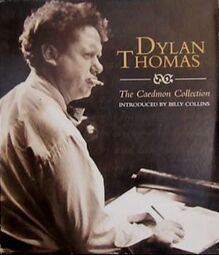
Dylan Thomas - The Caedmon Collection
A wonderful, eleven compact disc boxed-set comprising of the complete Dylan Thomas catalogue recorded by Caedmon Records in the early 1950's. Beautifully packaged and faithfully recreating the American artwork as it appeared on the original vinyl record albums released by Caedmon in the 1950's.
Dylan Thomas - The Caedmon Collection was released in 2002 by Caedmon records in association with Harper Collins Publishers, and was issued with the audio-book number, ISBN 0-06-079083-0.
The cover notes for this stunning compilation read;
"On February the 22nd, 1952, Dylan Thomas made his first recording for Caedmon Records, 'A Child's Christmas in Wales and Five Poems'. It was the first of many albums Thomas was to record for Caedmon. This recording launched not only Caedmon, but the spoken-word industry as well.
Here, at long last, in celebration of over fifty years of spoken-word publishing, Caedmon presents 'Dylan Thomas - The Caedmon Collection'. This unique collection includes not only Dylan Thomas reading his finest works, but also rare recordings of Thomas reading his favourite writers - including W.H. Auden and William Shakespeare.
Some of the many selections in this set include Thomas's poetry: 'Fern Hill', 'Do Not Go Gentle Into That Good Night', his prose; 'Adventures In The Skin Trade' and 'Quite Early One Morning', and his final work - 'Under Milk Wood', a play. The recording of 'Under Milk Wood' included here is the only bone in existence with Dylan Thomas in the cast. It owes its remarkable existence to the serendipitous placement of a microphone at centre stage minutes before the curtain was raised."
A wonderful, eleven compact disc boxed-set comprising of the complete Dylan Thomas catalogue recorded by Caedmon Records in the early 1950's. Beautifully packaged and faithfully recreating the American artwork as it appeared on the original vinyl record albums released by Caedmon in the 1950's.
Dylan Thomas - The Caedmon Collection was released in 2002 by Caedmon records in association with Harper Collins Publishers, and was issued with the audio-book number, ISBN 0-06-079083-0.
The cover notes for this stunning compilation read;
"On February the 22nd, 1952, Dylan Thomas made his first recording for Caedmon Records, 'A Child's Christmas in Wales and Five Poems'. It was the first of many albums Thomas was to record for Caedmon. This recording launched not only Caedmon, but the spoken-word industry as well.
Here, at long last, in celebration of over fifty years of spoken-word publishing, Caedmon presents 'Dylan Thomas - The Caedmon Collection'. This unique collection includes not only Dylan Thomas reading his finest works, but also rare recordings of Thomas reading his favourite writers - including W.H. Auden and William Shakespeare.
Some of the many selections in this set include Thomas's poetry: 'Fern Hill', 'Do Not Go Gentle Into That Good Night', his prose; 'Adventures In The Skin Trade' and 'Quite Early One Morning', and his final work - 'Under Milk Wood', a play. The recording of 'Under Milk Wood' included here is the only bone in existence with Dylan Thomas in the cast. It owes its remarkable existence to the serendipitous placement of a microphone at centre stage minutes before the curtain was raised."
The first four compact discs in this outstanding compact disc collection include the following Caedmon recordings;
A Child's Christmas In Wales / Fern Hill / Do Not Go Gentle Into That Good Night / In The White Giant's Thigh / Ballad of the Long-Legged Bait / Ceremony After a Fire Raid / A Few Words of a Kind / On The Marriage of a Virgin / The Hunchback in the Park / Over Sir John's Hill / Laugharne / Especially When the October Wind/ Lament / Poem On His Birthday / Should Lanterns Shine / There was a Saviour / A Refusal to Mourn the Death, by Fire, of a Child in London / If I Were Tickled by the Rub of Love / And Death Shall Have No Dominion A Winter's Tale / Author's Prologue / The Hand That Signed The Paper / Altarwise by Owl light / The Tombstone Told Where She Died / If My Head Hurt A Hair's Foot / Poem In October / Love In The Asylum / In My Craft or Sullen Art / Dawn Raid / Light Breaks Where No Sun Shines / After The Funeral / In Country Sleep / Quite Early One Morning / Reminiscences of Childhood / A Visit to Grandpa's / Holiday Memory / A Story / The Voice of Dylan Thomas / Introduction to Over Sir John's Hill / In Country Heaven / Revisions of In Country Heaven / Over Sir John's Hill / In Country Sleep/ In The White Giant's Thigh / Dylan Thomas and Edith Sitwell Read and Discuss Her Poetry.
A Child's Christmas In Wales / Fern Hill / Do Not Go Gentle Into That Good Night / In The White Giant's Thigh / Ballad of the Long-Legged Bait / Ceremony After a Fire Raid / A Few Words of a Kind / On The Marriage of a Virgin / The Hunchback in the Park / Over Sir John's Hill / Laugharne / Especially When the October Wind/ Lament / Poem On His Birthday / Should Lanterns Shine / There was a Saviour / A Refusal to Mourn the Death, by Fire, of a Child in London / If I Were Tickled by the Rub of Love / And Death Shall Have No Dominion A Winter's Tale / Author's Prologue / The Hand That Signed The Paper / Altarwise by Owl light / The Tombstone Told Where She Died / If My Head Hurt A Hair's Foot / Poem In October / Love In The Asylum / In My Craft or Sullen Art / Dawn Raid / Light Breaks Where No Sun Shines / After The Funeral / In Country Sleep / Quite Early One Morning / Reminiscences of Childhood / A Visit to Grandpa's / Holiday Memory / A Story / The Voice of Dylan Thomas / Introduction to Over Sir John's Hill / In Country Heaven / Revisions of In Country Heaven / Over Sir John's Hill / In Country Sleep/ In The White Giant's Thigh / Dylan Thomas and Edith Sitwell Read and Discuss Her Poetry.
Two of the Caedmon record label inspired compact discs which are part of this impressive eleven disc boxed-set compilation collection.
The covers for discs five through to eight. The track-listing for these four discs is as follows;
A Visit to America / The Bards / Master and Bos'n Song / As I Walked Out One Evening / Chard Witlow / Naming of Parts / The Owl / Broken Appointment / To Lizbie Browne / In Death Divided / An Irreverent Introduction / The Traveler's Curse After Misdirection / A Glass of Beer / One Poet Visits Another / An Introduction to Thomas Hardy / To Lizbie Browne / The Ruined Maid / Lent / Song / To My Son Aged Eight / As I Walked Out One Evening / Master and Bos'n Song / Passing the Graveyard / In Tara's Halls / The Three Bushes / Lapis Lazuli / This Side of Truth / In My Craft or Sullen Art / The Speech of Oedipus at Colonus / Three Things / The Circus Animals / Leda and the Swan / Solomon and the Witch / Long-Legged Fly / The three Bushes / The Dialogue of Self and Soul / For Anne Gregory / The Libertine / News of the World II / At The Keyhole / A Novelette / A Woman's History / Whales, Weep Not / September 1, 1939 / I Knock at the Door, Chapter II / Watchman, What of the Night? / The Collier / Child Lovers / Sacco Writes to his Son / The Child on the Cliffs / Strange Meeting / John Kinsella's Lament for Mrs. Mary Moore / The Leaden Echo and the Golden Echo / The Ship of Death / Polly Perkins / Welsh Incident / Counting the Beats / Lift Boy / Old Man / Naming of Parts / O Boys! O Boys! / My Dark-headed Kathchen / Evening in the Sanitarium / Parody 'I Climb the Stairs After a Tedious Masquerade / Senex / On a Portrait of a Deaf Man / The Day Set for Our Wedding / The Flying Bum / King Lear / The Duchess of Malfi / Paradise Lost Books i and II / Extract from Christopher Marlowe's Dr, Faustus.
A Visit to America / The Bards / Master and Bos'n Song / As I Walked Out One Evening / Chard Witlow / Naming of Parts / The Owl / Broken Appointment / To Lizbie Browne / In Death Divided / An Irreverent Introduction / The Traveler's Curse After Misdirection / A Glass of Beer / One Poet Visits Another / An Introduction to Thomas Hardy / To Lizbie Browne / The Ruined Maid / Lent / Song / To My Son Aged Eight / As I Walked Out One Evening / Master and Bos'n Song / Passing the Graveyard / In Tara's Halls / The Three Bushes / Lapis Lazuli / This Side of Truth / In My Craft or Sullen Art / The Speech of Oedipus at Colonus / Three Things / The Circus Animals / Leda and the Swan / Solomon and the Witch / Long-Legged Fly / The three Bushes / The Dialogue of Self and Soul / For Anne Gregory / The Libertine / News of the World II / At The Keyhole / A Novelette / A Woman's History / Whales, Weep Not / September 1, 1939 / I Knock at the Door, Chapter II / Watchman, What of the Night? / The Collier / Child Lovers / Sacco Writes to his Son / The Child on the Cliffs / Strange Meeting / John Kinsella's Lament for Mrs. Mary Moore / The Leaden Echo and the Golden Echo / The Ship of Death / Polly Perkins / Welsh Incident / Counting the Beats / Lift Boy / Old Man / Naming of Parts / O Boys! O Boys! / My Dark-headed Kathchen / Evening in the Sanitarium / Parody 'I Climb the Stairs After a Tedious Masquerade / Senex / On a Portrait of a Deaf Man / The Day Set for Our Wedding / The Flying Bum / King Lear / The Duchess of Malfi / Paradise Lost Books i and II / Extract from Christopher Marlowe's Dr, Faustus.
The track-listing for the final three compact discs;
The complete full-cast recordings of 'Under Milk Wood' and 'Return Journey to Swansea' / On Reading Poetry Aloud / If My Head Hurt a Hair's Foot / On Reading Poetry Aloud Part II / Poem in October / Among Those Killed in the Dawn Raid Was A Man Aged One Hundred / The Force That Through the Green Fuse / The complete 'Adventures in the Skin Trade'.
The complete full-cast recordings of 'Under Milk Wood' and 'Return Journey to Swansea' / On Reading Poetry Aloud / If My Head Hurt a Hair's Foot / On Reading Poetry Aloud Part II / Poem in October / Among Those Killed in the Dawn Raid Was A Man Aged One Hundred / The Force That Through the Green Fuse / The complete 'Adventures in the Skin Trade'.
A Selection of Official Dylan Thomas Related DVD Releases
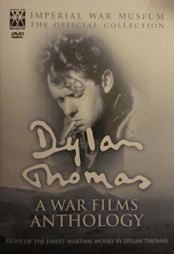
Dylan Thomas - A War Films Anthology, 2006
Released by Simply Home Entertainment , this is the 2006 DVD release of the Imperial War Museum's official collection of the short propaganda films which Dylan Thomas contributed on for the Ministry of Information during his employment with Strand Films during the Second World War. Powerfully scripted by Dylan Thomas, they show a completely different side to his writing and prove to be an otherwise little- known aspect of Dylan Thomas's talent as a writer.
This anthology presents eight of the films in which Dylan Thomas was involved with between the years 1942 to 1945, all complete and uncut. The film titles, along with their brief descriptions, include;
'These Are the Men' (1943) Co-devised with Award-winning film editor Alan Osbiston, this film launches a blistering attack on the Nazi party and their leaders, cleverly re-voicing their speeches with their own clever script to expose their shameful secrets and murderous intent. The film was voiced by James McKechnie and Bryan Herbert. The actual footage included in the film was from the German film director, producer and screen writer Leni Riefenstahl's powerful Nazi propaganda footage filmed at the Nuremberg rallies.
'Balloon Site 568' (1942) Dylan Thomas co-scripted this short film, sponsored by the Ministry of Information, about four young women from the Women's Auxiliary Air Force who work together as barrage balloon operators. The film, directed by Ivan Moffat and produced by Alexander Shaw of Strand Films, follows the girls from their initial training to their first posting.
'Wales - Green Mountain, Black Mountain' (1942) A beautiful and hauntingly filmed piece, eloquently and poetically scripted by Dylan Thomas. The film in essence is a tribute to Wales at war, saluting the contribution of the miners, steel workers, farmers and quarrymen to the war effort. The film was directed by John Eldridge and featured the vocal talents of William Griffiths and David Raymond. The film was again produced by Strand Films on behalf of the Ministry of Information.
'New Towns For Old' (1942) Directed by John Eldridge from Strand Films and commissioned by the Ministry of Information, this short, Dylan Thomas scripted film, addresses the future need for town planning and slum clearance in Sheffield, for when the war will eventually be over.
'The Battle For Freedom' (1942) Saluting the contribution made by the British Empire to the war effort, Dylan Thomas's script is full of confidence for the prosperity of the Empire after the destructive threat and terror from the Axis forces is finally defeated. Dylan Thomas's script for this short film is a perfect example of the British 'Bulldog' spirit which would eventually win the war for the allies. The film was directed by Alan Osbiston and Dylan's script was narrated by Kent Stevenson. The film was produced by Basil Charles Wright for Strand Films.
'CEMA' (1942) Directed by John Banting, Charles De la Tour and Alan Osbiston and written by Dylan Thomas, Peter Scott, Desmond Dickinson and Alan Osbiston this film, focusing on the Council for Encouragement of Music and Arts, featured the talents of Sybil Thorndike, Myra Hess and Esme Church bringing pleasure, inspiration and entertainment to the inhabitants of towns and employees in factories bombed during the worst hostilities of the war.
'A City Reborn' (1945) Dylan Thomas's script of hope, dedicated to the City of Coventry, whose inhabitants refused to crumble despite the horrific bombing which reduced the city to rubble. This script must have been a very poignant piece for Dylan Thomas to write, as his own home town was virtually destroyed by German bombers over three nights in 1941. Dylan himself was seen after the blitz of Swansea by a friend, in tears, surveying the ruins of his 'ugly, lovely town' he was heard to tearfully say, 'Our Swansea is dead'.
The script for this later film was written entirely by Dylan Thomas, was directed by John Eldridge and starred Bill Owen as a soldier returning home to Coventry, Connie Mason, Charles Rolfe and Betty Mallet.
This script was written by Dylan Thomas for Gryphon Films on behalf of the Ministry of Information.
'A Soldier Comes Home' (1945) A beautiful and touching film scripted by Dylan Thomas. it is the story of a war-weary soldier returning home to spend time with his family whilst on leave and having to explain why he must remain in the army despite hostilities being over. This last wartime film to use a Dylan Thomas script was directed by John Eldridge and starred Robert Griffith, Edgar Hill and Nancy O' Neil. 'A Soldier Comes home' was produced by The Film Producer's Guild and Gryphon Films and was commissioned by the Ministry of Information.
This wonderfully presented DVD release was issued by Simply Entertainment with the catalogue number 132568.
Released by Simply Home Entertainment , this is the 2006 DVD release of the Imperial War Museum's official collection of the short propaganda films which Dylan Thomas contributed on for the Ministry of Information during his employment with Strand Films during the Second World War. Powerfully scripted by Dylan Thomas, they show a completely different side to his writing and prove to be an otherwise little- known aspect of Dylan Thomas's talent as a writer.
This anthology presents eight of the films in which Dylan Thomas was involved with between the years 1942 to 1945, all complete and uncut. The film titles, along with their brief descriptions, include;
'These Are the Men' (1943) Co-devised with Award-winning film editor Alan Osbiston, this film launches a blistering attack on the Nazi party and their leaders, cleverly re-voicing their speeches with their own clever script to expose their shameful secrets and murderous intent. The film was voiced by James McKechnie and Bryan Herbert. The actual footage included in the film was from the German film director, producer and screen writer Leni Riefenstahl's powerful Nazi propaganda footage filmed at the Nuremberg rallies.
'Balloon Site 568' (1942) Dylan Thomas co-scripted this short film, sponsored by the Ministry of Information, about four young women from the Women's Auxiliary Air Force who work together as barrage balloon operators. The film, directed by Ivan Moffat and produced by Alexander Shaw of Strand Films, follows the girls from their initial training to their first posting.
'Wales - Green Mountain, Black Mountain' (1942) A beautiful and hauntingly filmed piece, eloquently and poetically scripted by Dylan Thomas. The film in essence is a tribute to Wales at war, saluting the contribution of the miners, steel workers, farmers and quarrymen to the war effort. The film was directed by John Eldridge and featured the vocal talents of William Griffiths and David Raymond. The film was again produced by Strand Films on behalf of the Ministry of Information.
'New Towns For Old' (1942) Directed by John Eldridge from Strand Films and commissioned by the Ministry of Information, this short, Dylan Thomas scripted film, addresses the future need for town planning and slum clearance in Sheffield, for when the war will eventually be over.
'The Battle For Freedom' (1942) Saluting the contribution made by the British Empire to the war effort, Dylan Thomas's script is full of confidence for the prosperity of the Empire after the destructive threat and terror from the Axis forces is finally defeated. Dylan Thomas's script for this short film is a perfect example of the British 'Bulldog' spirit which would eventually win the war for the allies. The film was directed by Alan Osbiston and Dylan's script was narrated by Kent Stevenson. The film was produced by Basil Charles Wright for Strand Films.
'CEMA' (1942) Directed by John Banting, Charles De la Tour and Alan Osbiston and written by Dylan Thomas, Peter Scott, Desmond Dickinson and Alan Osbiston this film, focusing on the Council for Encouragement of Music and Arts, featured the talents of Sybil Thorndike, Myra Hess and Esme Church bringing pleasure, inspiration and entertainment to the inhabitants of towns and employees in factories bombed during the worst hostilities of the war.
'A City Reborn' (1945) Dylan Thomas's script of hope, dedicated to the City of Coventry, whose inhabitants refused to crumble despite the horrific bombing which reduced the city to rubble. This script must have been a very poignant piece for Dylan Thomas to write, as his own home town was virtually destroyed by German bombers over three nights in 1941. Dylan himself was seen after the blitz of Swansea by a friend, in tears, surveying the ruins of his 'ugly, lovely town' he was heard to tearfully say, 'Our Swansea is dead'.
The script for this later film was written entirely by Dylan Thomas, was directed by John Eldridge and starred Bill Owen as a soldier returning home to Coventry, Connie Mason, Charles Rolfe and Betty Mallet.
This script was written by Dylan Thomas for Gryphon Films on behalf of the Ministry of Information.
'A Soldier Comes Home' (1945) A beautiful and touching film scripted by Dylan Thomas. it is the story of a war-weary soldier returning home to spend time with his family whilst on leave and having to explain why he must remain in the army despite hostilities being over. This last wartime film to use a Dylan Thomas script was directed by John Eldridge and starred Robert Griffith, Edgar Hill and Nancy O' Neil. 'A Soldier Comes home' was produced by The Film Producer's Guild and Gryphon Films and was commissioned by the Ministry of Information.
This wonderfully presented DVD release was issued by Simply Entertainment with the catalogue number 132568.
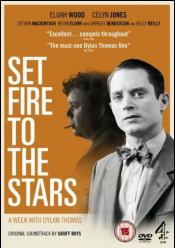
'Set Fire To The Stars' Channel 4 / Mad As Birds Films 2014
A copy of the official U.K. DVD release of the Award-winning film, 'Set Fire To The Stars'.
This beautifully filmed and compelling drama stars Celyn Jones in a powerful portrayal of Dylan Thomas, supported by Elijah Wood in the role of John Malcom Brinnin. The film also starred Steven Macintosh, Shirley Henderson and Kevin Eldon. Caitlin Thomas was portrayed by Kelly Reilly.
The film. directed by BAFTA nominated Andy Goddard, who co-wrote the screenplay with Celyn Jones, was released and distributed through Channel 4 DVD and FFilm Cymru Wales and Mad As Birds Films Limited in 2015.
The film was released in British cinemas on November the 7th 2014.
'The Times', from a review in 2014, wrote;
"Celyn Jones as Thomas..The kind of performance the term 'Tour de Force' was invented for".
The soundtrack to this wonderful film was written and performed by Gruff Rhys.
The extra features which appear on this official DVD release include deleted and extended scenes, three Dylan Thomas poems read by Celyn Jones and 'Love In The Asylum' performed by the complete cast.
The synopsis, which appears as part of this DVD's cover notes, reads;
"Set in 1950's New York and starring Elijah Wood as John Malcolm Brinnin, the aspiring young American poet who finds his ordered world shaken when he embarks on a week-long retreat to save his hell raising hero, Dylan Thomas, played by Celyn Jones.
Directed by BAFTA - nominated director Andy Goddard, this visually stunning film, shot entirely in black and white, is a cautionary tale about meeting your heroes, the dirty business of celebrity and about what may have happened in an East Coast boathouse when an earnest ingenue shared cabin space with his idol, the greatest living poet of the twentieth century."
The film was released by Channel 4 DVD and Mad As Birds Films and issued with the catalogue number C4DVD 10575.
A copy of the official U.K. DVD release of the Award-winning film, 'Set Fire To The Stars'.
This beautifully filmed and compelling drama stars Celyn Jones in a powerful portrayal of Dylan Thomas, supported by Elijah Wood in the role of John Malcom Brinnin. The film also starred Steven Macintosh, Shirley Henderson and Kevin Eldon. Caitlin Thomas was portrayed by Kelly Reilly.
The film. directed by BAFTA nominated Andy Goddard, who co-wrote the screenplay with Celyn Jones, was released and distributed through Channel 4 DVD and FFilm Cymru Wales and Mad As Birds Films Limited in 2015.
The film was released in British cinemas on November the 7th 2014.
'The Times', from a review in 2014, wrote;
"Celyn Jones as Thomas..The kind of performance the term 'Tour de Force' was invented for".
The soundtrack to this wonderful film was written and performed by Gruff Rhys.
The extra features which appear on this official DVD release include deleted and extended scenes, three Dylan Thomas poems read by Celyn Jones and 'Love In The Asylum' performed by the complete cast.
The synopsis, which appears as part of this DVD's cover notes, reads;
"Set in 1950's New York and starring Elijah Wood as John Malcolm Brinnin, the aspiring young American poet who finds his ordered world shaken when he embarks on a week-long retreat to save his hell raising hero, Dylan Thomas, played by Celyn Jones.
Directed by BAFTA - nominated director Andy Goddard, this visually stunning film, shot entirely in black and white, is a cautionary tale about meeting your heroes, the dirty business of celebrity and about what may have happened in an East Coast boathouse when an earnest ingenue shared cabin space with his idol, the greatest living poet of the twentieth century."
The film was released by Channel 4 DVD and Mad As Birds Films and issued with the catalogue number C4DVD 10575.
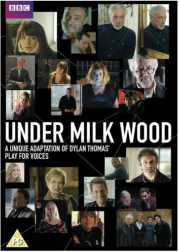
'Under Milk Wood' BBC Cymru / Wales, 2015
A unique adaption of Dylan Thomas' Play For Voices', performed by a community of top Welsh talent in New York, Los Angeles, London, Cardiff and Dylan Thomas' s home town of Laugharne.
This production was adapted by B.B.C. Cymru / Wales in 2015 and was distributed by B.B.C. Worldwide Limited.
As the cover notes state, this was;
"A unique one-off collage of famous voices and faces, intercut with evocative imagery inspired by the play in collaboration with National Theatre Wales to celebrate the centenary year of the poet's birth."
Directed by Pip Broughton on behalf of B.B.C. Wales / Cymru and produced by Bethan Jones, alongside Sir Tom Jones in the role of Captain Cat, a host of Welsh talent appears in this special production including; Michael Sheen, Matthew Rhys, Sian Phillips, Jonathan Pryce, Bryn Terfel, Charlotte Church, Katherine Jenkins, Robert Pugh, Richard Harrington, Owen Teale and Jon Tregenna.
The Guardian Newspaper wrote of this adaption;
"Never has the screen paid such a compliment to poetry."
This DVD edition was released in 2015 by B.B.C. Cymru / Wales with the catalogue number BBCDVD4072.
A unique adaption of Dylan Thomas' Play For Voices', performed by a community of top Welsh talent in New York, Los Angeles, London, Cardiff and Dylan Thomas' s home town of Laugharne.
This production was adapted by B.B.C. Cymru / Wales in 2015 and was distributed by B.B.C. Worldwide Limited.
As the cover notes state, this was;
"A unique one-off collage of famous voices and faces, intercut with evocative imagery inspired by the play in collaboration with National Theatre Wales to celebrate the centenary year of the poet's birth."
Directed by Pip Broughton on behalf of B.B.C. Wales / Cymru and produced by Bethan Jones, alongside Sir Tom Jones in the role of Captain Cat, a host of Welsh talent appears in this special production including; Michael Sheen, Matthew Rhys, Sian Phillips, Jonathan Pryce, Bryn Terfel, Charlotte Church, Katherine Jenkins, Robert Pugh, Richard Harrington, Owen Teale and Jon Tregenna.
The Guardian Newspaper wrote of this adaption;
"Never has the screen paid such a compliment to poetry."
This DVD edition was released in 2015 by B.B.C. Cymru / Wales with the catalogue number BBCDVD4072.
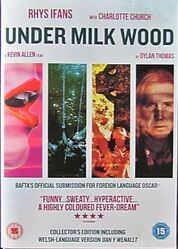
'Under Milk Wood' Ffilm Cymru Wales, 2015
An official copy of the outstanding, atmospheric, and beautifully filmed 2015 version of 'Under Milk Wood'.
An official copy of the outstanding, atmospheric, and beautifully filmed 2015 version of 'Under Milk Wood'.
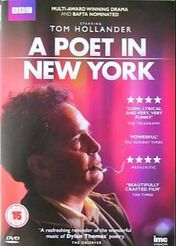
'A Poet In New York' BBC Worldwide, 2017
An official DVD copy of the Award winning biographical drama, 'A Poet In New York'.
The film was released on DVD by BBC Worldwide in association with IMC Vision in 2017.
The film, especially made for television, was first broadcast, in a shortened hour-long version, on BBC One Wales / Cymru on the 30th of April, 2014. The full version was later broadcast on BBC Two on the 18th of May the same year.
'A Poet In New York' was written by Welsh writer, Andrew Wynford Davies and directed by Aisling Walsh. The role of Dylan Thomas was portrayed magnificently by Tom Hollander, supported wonderfully by Essie Davies in the role of Caitlin Thomas.
The cover notes for this official BBC DVD release read;
"A life filled with passion, fame and the harsh realities of addiction is the story behind Dylan Thomas. Beautifully portrayed by Tom Hollander, Thomas was one of the most renowned poets the world has ever seen. He created some of the most memorable lines in the English language. His brilliance, wit, popularity and electrifying tours made him a much loved celebrity in the U.S. But his failing marriage, heightened fame and wild, hard-drinking lifestyle led to his untimely death in 1953 at the young age of just thirty-nine.
This film has been critically acclaimed. The Telegraph described it as, 'Lush, lyrical and very, very funny'. The Times, 'Beautifully crafted film', and The Observer, 'A refreshing reminder of the wonderful music of Dylan Thomas's poetry'.
For his portrayal of Dylan Thomas, Tom Hollander won the Best Actor award at the Royal Television Society Awards and the drama itself won Best Television Feature at the Bafta Cymru Awards.
An official DVD copy of the Award winning biographical drama, 'A Poet In New York'.
The film was released on DVD by BBC Worldwide in association with IMC Vision in 2017.
The film, especially made for television, was first broadcast, in a shortened hour-long version, on BBC One Wales / Cymru on the 30th of April, 2014. The full version was later broadcast on BBC Two on the 18th of May the same year.
'A Poet In New York' was written by Welsh writer, Andrew Wynford Davies and directed by Aisling Walsh. The role of Dylan Thomas was portrayed magnificently by Tom Hollander, supported wonderfully by Essie Davies in the role of Caitlin Thomas.
The cover notes for this official BBC DVD release read;
"A life filled with passion, fame and the harsh realities of addiction is the story behind Dylan Thomas. Beautifully portrayed by Tom Hollander, Thomas was one of the most renowned poets the world has ever seen. He created some of the most memorable lines in the English language. His brilliance, wit, popularity and electrifying tours made him a much loved celebrity in the U.S. But his failing marriage, heightened fame and wild, hard-drinking lifestyle led to his untimely death in 1953 at the young age of just thirty-nine.
This film has been critically acclaimed. The Telegraph described it as, 'Lush, lyrical and very, very funny'. The Times, 'Beautifully crafted film', and The Observer, 'A refreshing reminder of the wonderful music of Dylan Thomas's poetry'.
For his portrayal of Dylan Thomas, Tom Hollander won the Best Actor award at the Royal Television Society Awards and the drama itself won Best Television Feature at the Bafta Cymru Awards.
